How historically accurate is the movie The King's Speech
In 2010, The King’s Speech won the Oscar for Best Picture and grossed over $414 million worldwide. It was an unlikely box office champion because it was based on a true story about King George VI of Britain (1895-1952) and an Australian speech therapist Lionel Logue (1880-1953). It shows how Logue helped the king overcome a crippling stammer and how this helped him lead his country during World War II. The movie was directed by Tom Hooper and written by David Seidler.
Before the movie began filming, the writer, Seidler, found Logue's journal and incorporated elements from the journal into the movie. However, despite this, the historical accuracy of the movie has been questioned and even widely criticized.

When does the King's Speech take place?
After George V's death, he was succeeded by his eldest son, who became Edward VII in 1936. Edward VII's reign was both brief and controversial. Edward wanted to marry a divorced American, Wallis Simpson. Marrying a divorced was unacceptable to many in Britain at this time as the King was also head of the Church of England. Divorce was socially unacceptable, and the Anglican Bishops and others denounced the idea of the monarch marrying a divorced woman.
However, there were some inaccuracies in the movie that troubled viewers. One of the scenes that caused the most controversy was when Sir Winston Churchill, the future leader of war-time Britain, supported the accession of George V. This scene misrepresented Churchill's view of Edward's abdication entirely. Churchill supported Edward VII (1894-1972) and believed that he should remain as king despite his marriage to Wallis Simpson. He was friendly with the abdicated king and remained a supporter. [3]
Unlike in the movie, Churchill did have grave doubts about the ability of George VI to carry out his Royal duties. He was not alone in the belief, and many others shared that view in the highest circles of the British government. Over time, he did come to accept the younger brother of Edward VII and came to respect him as an able monarch and leader . [4]
The King and his Stutter
The movie shows that his speech impediment was a result of his insecurity and shyness. [5] This was very much the case, and George VI did have a terrible stutter from childhood. The King’s Speech accurately shows the real problems caused by the future George VI and the entire Royal Family. In one scene at the opening of an exhibition celebrating the British Empire, George struggles with a speech and becomes visibly upset. The movie shows many senior officials and members of the Royal Family becoming gravely concerned about this. In the 1930a, when the movie is set, for the first-time, Royalty members were expected to speak in public and be effective communicators because of the growing importance of the mass media. [6]
When did Lionel Logue begin treating George VI?
Cooper’s movie relates how George had been seeking help all his life for his stammer, and he tried every technique and treatment available for the time, which is true. The 2010 motion picture does really capture the sense of desperation and anxiety that the future George VI had over his speech impediment. He is shown as going in desperation to the Australian Logue, and this is also correct. The therapist is shown as using innovative techniques to help George overcome his stammer, which is right. The Australian was an early pioneer in speech and language therapy, and he was an innovator. [7] The film shows Rush trying to instill more confidence in the Royal. He adopts several strategies, but none are shown to work.
How did Logue treat George VI's speech impediment?
In real life, this did not cause a crisis in the relationship between the British sovereign and the Australian therapist. It is correct that Logue was not formally qualified because there was no education system for language therapy when he was young. Instead, he was self-taught and had traveled the world, studying the ideas of respected speech therapists. The movie leaves the viewers in no doubt that the king and the Royal Family owed the Australian a great debt, and this was the case, and when George VI died, his widow, the Queen, wrote to the therapist to thank him for all he had done for her husband. [8]
What was the relationship between King George VI and Lionel Logue?
The movie shows that the two men began to become real friends over time, despite their differences. This was the case, and it appears that both men liked each other and even enjoyed each other’s company. The relationship between the British king and the Australian is very realistically shown, and they remained friends until the early death of George VI. The movie shows that Logue was present when George made important Radio broadcasts to the British Public. This was the case, but Logue continued to coach the king to speak in public for many years.
The therapist is shown as being very much at ease in the King's presence and treating him like any other client. This was not the case. Despite their genuine friendship, Logue would have been expected to have been somewhat formal and respect the Royal Person of the King at all times. In real life, Logue was not as easy-going and familiar with George VI as portrayed in the historical drama. [9]
Was George VI accurately portrayed in the King's Speech?
Colin Firth’s performance was widely praised. The British actor won the Academy Award for Best Actor. While Firth's performance was widely acclaimed, there were some concerns about how accurately he portrayed the monarch. In the main, Firth did manage to capture George VI and his character in the feature film. The British actor did correctly show that the monarch was a timid and insecure man who felt that he was not equal to his Royal duties, and this was something that greatly distressed him. [10]
This was the case, and the monarch became widely respected for his leadership and his calm dignity. However, the script tended to be overly sympathetic to George and avoided his character's rather unpleasant aspects. He was alleged to have both fits of anger and alleged acts of domestic violence. Those allegations have not been confirmed.
Helena Bonham Carter's performance was praised, and she does capture the personality of Queen Elizabeth (1900-2002). She was a very supportive wife and dedicated to her husband. She did not want him to become king because she feared what it would do to him. Her family, as shown in the feature film. [12] Geoffrey Rush played the character of the speech and language therapist Logue, and he presented him as a larger-than-life figure who was charismatic, and this was indeed the case. It is generally agreed that Rush really captured the personality of the acclaimed speech and language therapist.
How realistic is the King's Speech?
Further reading.
Ziegler, Philip, King Edward VIII: The Official Biography ( London, Collins, 1990).
- Hankering for History
Hanker: To have a strong, often restless desire, in this case for–you guessed it–history!
Is The King’s Speech Historically Accurate?

I will start by saying that The King’s Speech is an exceptional movie. I took the opportunity to see this movie in theaters when it first came out, in 2010. There is a reason that this movie, starring Colin Firth and Geoffrey Rush, received four Oscar awards (and was nominated for another eight) [1]; unfortunately, that reason was not because of the historical accuracy of the film.
It is no secret that many of the details in this movie have been skewed and exaggerated. Hugo Vickers, a royal adviser to film, stated that he understands that the adjustments were necessary to make an entertaining movie. He also believed that correct details are important, however, for this particular movie the “essence of the story” is what was most important.
“My view is that a film is a film, and you have to move the drama on…It’s the essence of the story that counts, and the essence of the story here is very sound indeed.” [2] -Hugo Vickers (1/9/2011)

So while the movie wasn’t completely honest, it got out its message. As I look into the historical accuracy–or lack of historical accuracy–in this film, I run across article after article crying foul. Slate’s review of the film is entitled Churchill Didn’t Say That – The King’s Speech is riddled with gross falsifications of history . The Washington Post reviews the movie as “ Brilliant filmmaking, less-than-brilliant history .” My favorite article title is from New Republic; the headline of their article was simple– Royal Mess . However, the article with the hardest-hitting, historical-correcting blows comes from The Daily Beast. Their article, The King Who Couldn’t Speak , is a well-written piece by British historian Dr. Andrew Roberts. Dr. Roberts claims that the film “gets the story all wrong and is simply bad history.”
Dr.Andrew Roberts noted that,
“…viewers should know of the very many glaring and egregious inaccuracies and tired old myths that this otherwise charming film unquestioningly regurgitates.” [3] -Dr. Andrew Roberts (11/20/2010)
Some of the more egregious historical inaccuracies from his lists are:
- The time period of the movie. The speech therapist, Lionel Logue, started working with King George VI in 1926, not in 1930’s.
- The severity of his stutter. King George’s stutter was relatively mild compared to the movie’s portrayal.
- The politics. An example of this would be Winston Churchill. Winston Churchill is shown as supporting the Abdication of George VI’s elder brother King Edward VIII, whereas he violently opposed it.
While the list of smaller inaccuracies are too many to list, The King’s Speech, overall is excellent! As far as my moviegoing experience, The King’s Speech was so impressive that I can overlook the “egregious inaccuracies and tired old myths.” I highly recommend that you take the opportunity to watch this film. If you want a more detailed account of historical discrepancies, I suggest checking out the full article that I mentioned above from The Daily Beast.
[1] IMDb: Awards for The King’s Speech
[2] The Guardian: How historically accurate is The King’s Speech?
[3] The Daily Beast: The King Who Couldn’t Speak
More Stories
How sparta and rome influenced hitler and the nazis.

- People & Places
Why did FDR Serve 4 Terms as President?

- The History of...
The History of Harvard University
5 thoughts on “ is the king’s speech historically accurate ”.
This is why historians are historians and dramatists dramatists. Can’t we all get along? I am disappointed in the attitude of ”oh well, its for a good story”. No. We can tell great stories that are accurate. History is full of interesting stories. The Churchill mistake is inexcusable. Great Post, Grant!
this finna be a bruh moment Front?
you suck big weenis
Thats a funny one, i hate this film
Sucks big Weenis
Comments are closed.
You may have missed

Exploring What Is the Oldest Civilization: A Journey Through Ancient History

Who Was Pocahontas?

What Was the Battle of the Bulge?
Truth and Fiction in ‘The King’s Speech’
Historians and critics charge that George VI was a nitwit and a Nazi appeaser
On the heels of its 12 Academy Award nominations , “The King’s Speech,” an inspiring story of King George VI and his triumph over stuttering, is being criticized for historical inaccuracies.
It’s as predictable as the Oscars themselves. A new front-runner often means some fresh round of attacks, and the charge of historical distortion is a perennial one.
In this case, intellectual gadfly Christopher Hitchens and the New York Review of Books’ Martin Filler are charging that the monarch in question was no better than a Nazi appeaser and, in Filler’s words, “a nitwit.” They paint a portrait of the wartime king that is far different from the shy family man essayed by Oscar nominee (and favorite) Colin Firth.
“‘The King's Speech’ …perpetrates a gross falsification of history,” Hitchens wrote on Slate on Monday, saying the king was not worthy of hagiography. Fillers says the king had an uncontrollable temper and even struck his wife.
But Hugo Vickers, a historian who consulted on the film and author of a biography on the Queen Mother, disagreed: “He was a humble man and a courageous man and he was called upon to do a job for which he had not been trained,” he told TheWrap.
He said the depiction of a man struggling to overcome a crippling speech impediment is accurate.

The filmmakers themselves declined to comment, but have said publicly that the movie was carefully researched.
The appeasement charge stems from the king’s decision to pose with Neville Chamberlain on the balcony of Buckingham Palace after the prime minister negotiated the Munich Agreement with Hitler in 1938 (a fact that the movie skirts over).
Whether George VI’s evolving views of the threat of Nazism should be defined solely by that photo-op with Chamberlain are at the heart of the current debate. Historians and journalists sympathetic to the film say the criticism is overly simplistic.
When war came, King George VI and his wife bravely remained in London even as the blitzkrieg raged. It was his brother, Edward, they say, who was known to have Nazi sympathies, while the king eventually rallied the country – as the film depicts – to meet the threat of war.
And anyway, they add, the film is about stuttering, and not wartime politics.

Filler goes further than the acerbic Hitchens, emphasizing George VI’s personal deficits as much as the king’s leadership deficiencies.
“‘The King’s Speech’ doesn’t dwell on George’s limited intellectual capacities, but many who dealt first-hand with him did,” Filler wrote in the New York Review of Books .
For journalists such as Harold Evans, who reminisces about a wartime George VI in his book “My Paper Chase: True Stories of Vanished Times,” Hitchens and Filler misinterpret the king’s legacy. He also maintains that Hitchens’ anti-monarchist beliefs have colored the social critic’s view of history.
“It is hard for Americans to understand the atmosphere in England in the thirties. Everyone had lost a cousin or had a relative killed in World War I. They were horrified that we’d go back to war again,” Evans told TheWrap.
“It’s not a film about appeasement. It’s a film about the struggle of a man to overcome a great handicap,” he added.

Or is it just about Oscar politics?
Among Oscar campaigners, the articles by Hitchens and Filler are suspiciously timed – coming directly after the Weinstein Company film dominated the Oscar nominations, which followed an upset win at the Producers Guild Awards on Saturday.
For months critics have harped that “The Social Network” gets the story of Facebook’s founding gravely wrong.
Complaints about Hollywood biopics playing fast and loose with the facts are a staple of Oscar races (and are often gleefully passed along by rival films’ camps), and this season is shaping up to be no different.
In the case of “Network,” critics have chirped that the David Fincher overstates the importance of Harvard eating clubs to Mark Zuckerberg and the seminal role a painful breakup played in the creation of Facebook.

Last week at a Digital Life Design conference in Munich, Sean Parker, the Napster co-founder and Facebook executive played by Justin Timberlake in the movie, “a complete work of fiction.”
In his Golden Globes acceptance speech, “Network” screenwriter Aaron Sorkin seemed to answer those critiques by saying he was using Zuckerberg as a metaphor.
In past years, Oscar candidates such as “A Beautiful Mind,” “Saving Private Ryan” and “The Queen” have been similarly bedevilled by charges of inaccuracy.
Nor are these the first times that the portrait of King George VI painted in “The King’s Speech” has been called into question.
Just days after the film began its limited release, Andrew Roberts in The Daily Beast , griped about the “…very many glaring and egregious inaccuracies and tired old myths that this otherwise charming film unquestioningly regurgitates.”

However, this latest set of slams are particularly trenchant.
In addition to griping about George VI’s wartime leadership, Filler and Hitchens contend that the movie misrepresents the relationship between Winston Churchill and the monarch. In the film, Churchill is depicted as pushing for the abdication of Edward VIII, so that the king can marry American divorcee Wallis Simpson.
In reality, Churchill fiercely opposed the decision, and his support for Edward VIII initially led to a frosty relationship with his successor.
Splitting hairs, say those who endorse the film’s version of history.
“If this were a documentary, rather than a theatrical release, I’d be the first to complain,” Evans said, adding, “I feel irritated by this attempt to make a political point with something that is an inspirational film.”

The True Story Behind "The King's Speech"
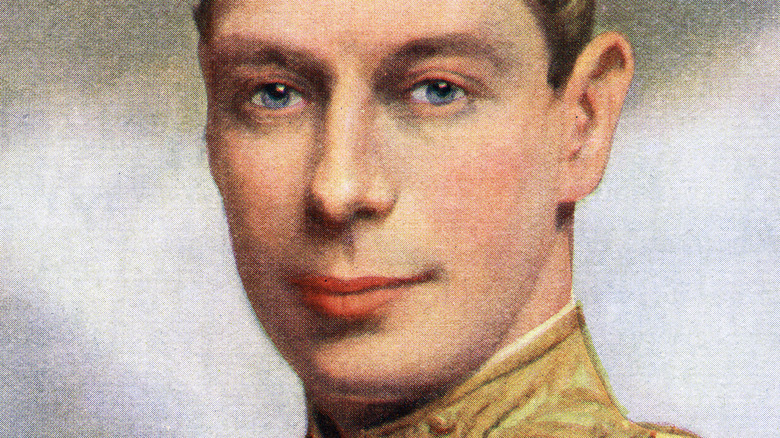
"The King's Speech" is a 2010 dramatic biographical film, recounting the friendship between King George VI of England and his Australian speech therapist, Lionel Logue. The film also covers Edward VIII's 1936 abdication, and George VI's subsequent coronation and shouldering of responsibility during World War II. George VI ultimately must conquer his stammer to assist and guide Britain during the war.
As a film, "The King's Speech" takes a few liberties with the historical timeline and in regards to simplifying certain characters. One element historians took particular umbrage with was the depiction of Winston Churchill . However, overall it is fairly faithful to the historical record. For one thing, George VI really did have a speech impediment since the age of eight, and Lionel Logue did work with him for several years. They did stay friends until they both died. Certain scenes, such as George VI's coronation, were praised for their accurate recapturing of the feel of the 1930s.
The main concept the film changed was simply adding drama to certain scenes, such as the speech announcing war with Germany towards the end. It also condensed the historical timeline significantly, shortening events. This was mostly done for the sake of keeping the narrative moving. Overall, however, " The King's Speech " is a fairly accurate, heartwarming rendering of George VI and Lionel Logue's friendship.
Prince Albert had a stutter as a child
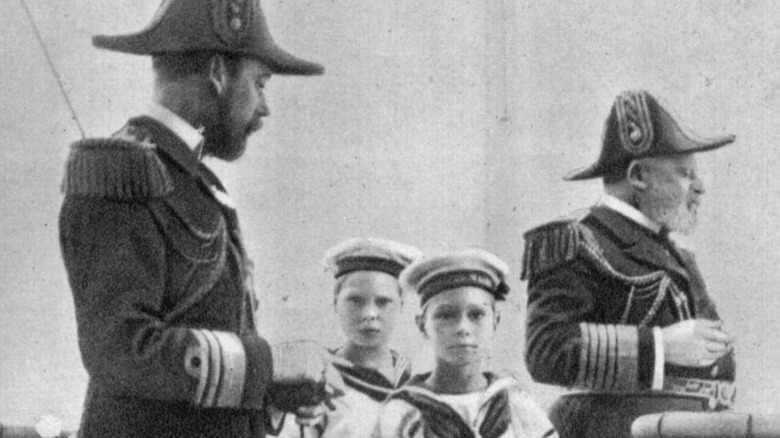
Prince Albert, later George VI, developed a stutter when he was eight that he carried through to his early adult life. His parents were not terribly affectionate with him, and he was susceptible to tears and tantrums – traits he also carried through his adult years, writes Biography . Given that many of his public duties required speeches, Albert needed to – and worked tirelessly – to fix his stammer with multiple doctors and therapists, writes Stuttering Help . He wasn't successful with any speech therapies until he worked with elocutionist and informal speech therapist Lionel Logue, beginning in the 1920s.
When Logue saw the then-Duke of York give a speech, he said to his son, "He's too old for me to manage a complete cure. But I could very nearly do it. I'm sure of that." (via Stuttering Help ). He was right, and his positive attitude helped the duke recover from previous failures that had made him believe the problem caused him to be mentally deficient instead of simply physically injured. Despite how long they worked together, the duke's speech issues had more to do with how held his jaw and pronounced words; the result was that his stammer was mainly cleared up in a matter of months as opposed to years.
Lionel Logue was a self-taught speech therapist
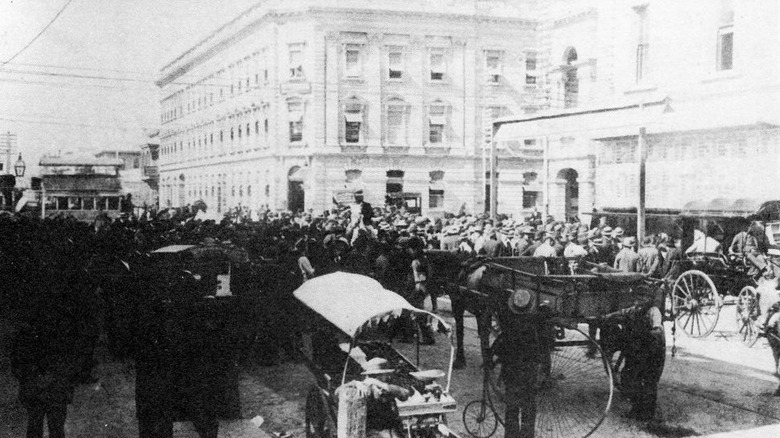
Lionel Logue was an Australian speech therapist who, not being formally trained, used methods he had discovered and created on his own. He worked as an elocutionist first, but fell into helping Australian World War I veterans with speech defects, writes The ASHA Leader . No one else was doing what he was with the veterans, and speech therapy and audiology programs didn't even get off the ground until the 1940s (via UNC Health Sciences Library ). Logue was even a founder of the College of Speech Therapists.
Just before World War I, Logue worked a variety of jobs as a teacher of elocution and drama, theater manager, and reciter of Shakespeare and Dickens (via Speech Language Therapy's Caroline Bowen, a speech language pathologist ). Logue worked with patients on their speech, but also on confidence and the self-belief that they could accomplish what they set out to do. He was empathetic with his patients, and learned from each case he worked on. Logue originally tried out as an actor, and as a result, his manner was somewhere between a teacher and an artist. He was serious about his life's work and resolved to avoid cheapening it by writing a book about his efforts with the king.
Logue began working with Prince Albert in 1926
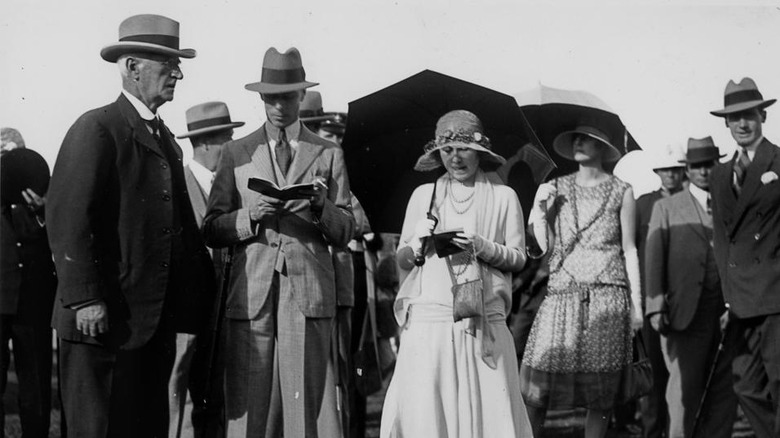
Elizabeth, the Duchess of York, first encouraged her husband to work with Lionel Logue, though the meeting as depicted in the film between Elizabeth and Logue likely didn't happen (via Logue and Conradi's "The King's Speech" ). Logue thus began working with the Duke of York in October 1926, soon after he opened his London practice on Harley Street. Logue first diagnosed the Duke with, according to CNN , acute nervous tension and the habit of closing the throat, which caused him to clip words out.
Logue met with him daily for the next two or three months (in advance of a visit to Australia), and his stammer was gone (for the most part) within that time frame; it didn't take years of treatment (via Speech Language Therapy ). Unlike in the film, in reality, the Duke and Logue weren't necessarily aiming for complete fluency. However, they did continue to work together for the next two decades, mainly on the royal's speeches.
Logue worked with Albert for over 15 years

Though the film condenses the timeline to make it seem as though everything takes place over just a few years, Logue and Albert worked together for decades (via CNN ). "The King's Speech" begins in 1925 with the close of the British Empire Exhibition, which would be historically accurate, but time simply speeds by until the film depicts the abdication of Edward VIII in 1936 and later the outbreak of war in 1939 in just a few hours; it doesn't really feel as though a decade and a half have passed.
Regardless, Logue and the duke worked together on speeches even after the duke had mostly mastered his stammer. Lionel Logue's methods were unorthodox and primarily self-taught. He never specifically said what course of treatment he worked on with the duke, saying, according to The ASHA Leader : "...on the matter of Speech Defects, when so much depends on the temperament and individuality, a case can always be produced that can prove you are wrong. That is why I won't write a book." Much of the ideas for the therapy sessions depicted in the film come from Logue's diaries (though plenty of the dialogue was invented), which were inherited by his grandson Mark. They were used in the film, though the director only saw them late in the film's production.
Any sort of therapy is inherently individual, not to mention personal (via Psychiatric Times ). It's no wonder that Logue decided to avoid writing about his work.
Wallis Simpson was a more complex person than the film indicates
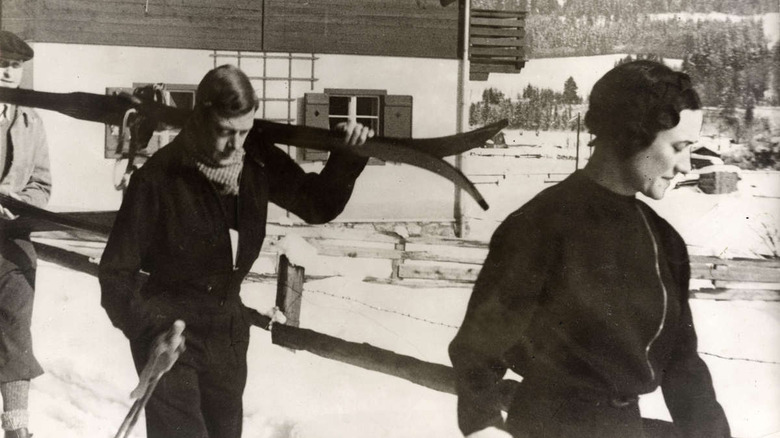
King Edward VIII was crowned in January 1936 and abdicated in December of the same year in order to marry Wallis Simpson , who had been twice divorced (via History ). His younger brother was proclaimed king the next day. The film is sympathetic to George VI and Elizabeth, and Wallis Simpson is cast as a vaguely Nazi-supporting villain; there is little depth to her character. However, her life and motivations were shrouded in rumors from the British upper classes and the media.
The upper classes, who learned about the Edward-Wallis romance before the British media, in particular saw her as an uncouth American divorcee, and had a hard time figuring out why Edward wanted to be with her. When the media did find out, in December 1936, she was both ruined and revered by them, according to History Extra . However, after moving overseas more-or-less permanently she faded from the spotlight. Her unfortunate reputation from the nobles stuck with her.
Ultimately, George VI didn't allow his brother and sister-in-law, who had moved to France, to be productive for the royal family; they asked multiple times for jobs and were denied (via History Extra ). Awful rumors followed Wallis Simpson even past her death in the 1980s, including one that stated she would do anything to become queen of England. Though it's clear both on and off screen that she and Elizabeth disliked each other, Wallis was more than a king-stealing villain.
Churchill was actually opposed to Edward VIII's abdication
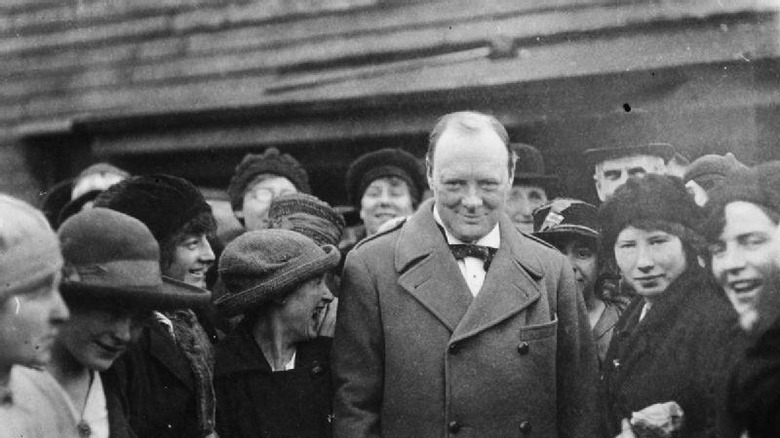
One major element of the film that historians had trouble with is Churchill's abrupt support of George VI, writes Daily History . In real life, he encouraged Edward VIII not to abdicate in 1936, and remained a supporter of the royal, believing something could be worked out without having to resort to abdication. George VI and Elizabeth didn't fully support Churchill later in life due to his actions during the abdication. However, Churchill was later knighted by Elizabeth II (via Biography ).
This element is likely written as such for the film due to the writers having a hard time writing someone as beloved as Churchill with actual flaws. The writers of "Saving Mr. Banks" had a similar issue with Walt Disney and his flaws. As a result, it is one of the only concrete historical aspects that left historians scratching their heads in confusion. Everything else that is changed in the film is mainly done for the sake of adaptation, drama, and the good of the narrative. This change seems to be for the sake of preserving Churchill's reputation. Considering the film's lead-up of events to World War II, and Churchill's role in Britain's survival, it isn't that surprising.
King George VI's coronation was less fraught than the film depicts
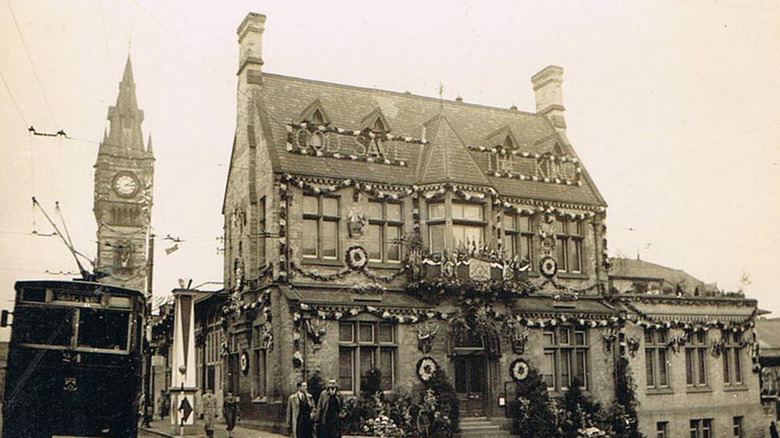
Logue worked with George VI on his coronation speech in 1937. Five days afterward, the king wrote a heartfelt thank you letter for the assistance (via Tatler ), attributing the success to Logue's "expert supervision and unfailing patience." Just as in the film, Logue and his wife are seated in the royal box, so high up that Myrtle Logue needed to use opera glasses in order to see, writes CNN .
However, by this time, the king had mostly mastered his speech impediment, and the dramatic scene in the film with Logue and St. Edward's chair is likely fictional. It was written for the sake of the narrative of George VI realizing he does have a voice. Reality isn't necessarily so cinematic, and after weeks of working on the speech with Logue, George VI delivered it flawlessly. Regardless, according to Daily History , the film accurately conveys the atmosphere of the 1930s and the coronation of a new king. In reality, the king and Logue likely didn't have the same miscommunication as they do in the film, and it is doubly heartwarming that Logue and his wife were seated with the royal family, just because of the services Logue had rendered the new king.
Logue was more deferential to his royal patient
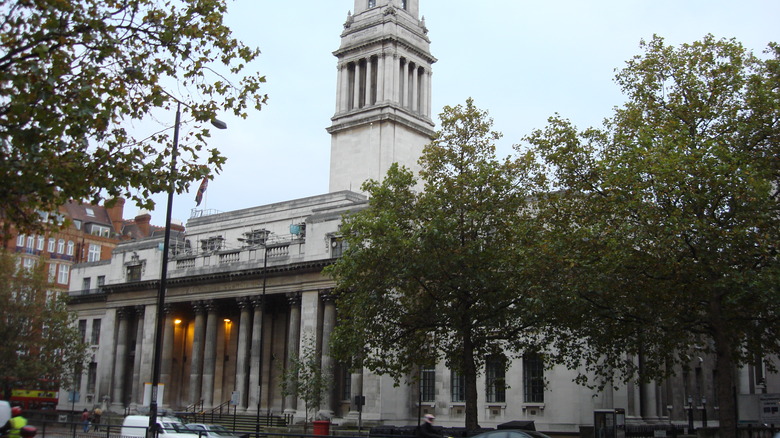
Geoffrey Rush's portrayal is much more animated than Logue likely was in reality. Logue certainly addressed Prince Albert respectfully, and the scenes of swearing in Logue's office are likely invented. Logue also never referred to the prince by a nickname, much less one used exclusively by the family. They were friends in real life, but their relationship was more realistically distant.
According to CNN , the letters Logue wrote to the king are addressed to "Your Royal Highness". On the other hand, the king signed his letters with his first name, indicating a measure of friendship between the two men. Logue also apparently allowed George VI to set treatment goals due to his position. Though they did end up being friends, Logue never forgot who exactly his patient was, and treated him accordingly (via Daily History ). Historical films always add heart-to-heart speeches between people which probably never actually happened but work for the sake of drama and the narrative. "The King's Speech" is no exception.
The speech announcing war with Germany was less dramatic
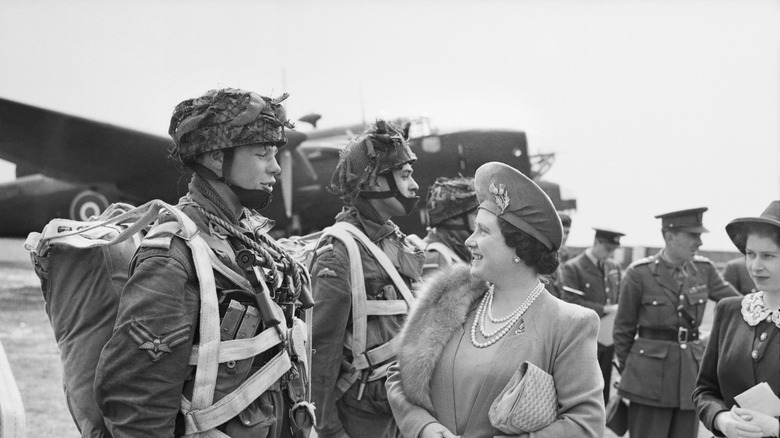
Lionel Logue further assisted George VI during the 1939 speech when he announced Britain was at war with Germany. However, Logue wasn't actually in the room with him, as the film depicts, and only wrote notes on places for the king to pause to collect himself when speaking or on which words to stress, according to CNN . Keep in mind that by this point in time, 13 years after meeting Logue, the king had essentially mastered his stammer. George VI also stood to give the speech, though photographs show him in full military uniform and sitting down.
Lionel Logue's diaries also answered a previously unknown question about the speech that was added to the film. George VI stammered on some of the W's in the speech, and according to a comment he made to Logue, it was so the people would recognize him, writes CNN .
The film turns the event into a climactic event, as a culmination of the years of work the king and Logue have put into his affliction – and which the audience has just watched on screen for the past two hours. Also, though it is unlikely the information was revealed at this exact time in real life, the character of Winston Churchill tells the king just before this speech that he, too, was a stammerer as a child, writes The Lancet . This element is true, though it is positioned for the sake of cinematic drama.
George and Logue's friendship didn't fracture over credentials
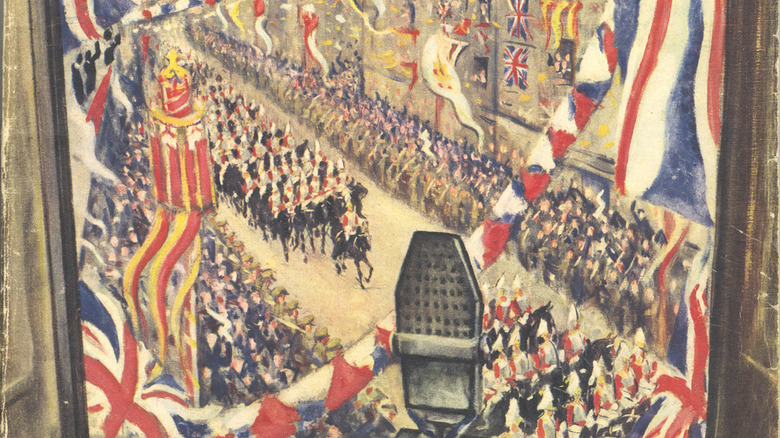
In the film, coronation preparations pause when the archbishop of Canterbury, Cosmo Lang, mentions that Logue doesn't have any formal training. Not having known this beforehand, George VI becomes outraged and only calms after Logue provokes him into speaking without stammering, causing him to realize that he actually can speak accurately. This entire element is invented for the film, presumably for the sake of drama (and humor).
By this point, the two men had known each other for over a decade and were friends. Though their relationship was primarily professional, in scouting out Logue's help, the king must have understood his credentials and it didn't bother him; after all, he worked with Logue, voluntarily, for decades (via Daily History ). Logue's formality likely kept their friendship professional enough that they probably had few personal disagreements.
Logue and the king wrote letters back and forth for years; the earlier letters were signed "Albert" and the later letters "George" by the king, according to CNN , indicating a measure of friendship that was likely meted out to few people. When Logue asked the king in 1948 if he would serve as patron of the College of Speech Therapists, George VI immediately agreed and it became known as the Royal College of Speech Therapy, writes The ASHA Leader .
The film has an obvious pro-George VI bias
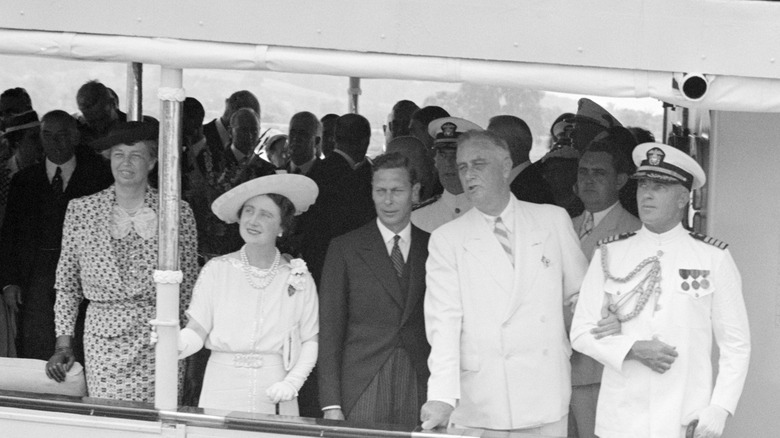
Due to being written from a historical perspective, "The King's Speech" supports George VI, Logue, Elizabeth, and even Winston Churchill as characters and historical figures much more than it does George V, Edward VIII, or Wallis Simpson. The film has an agenda and a narrative it set out to tell: the story of how George VI overcame his stammer and led a nation successfully through a war.
According to The Gazette , the film's textual inclusion of Logue's appointment as a Member of the Royal Victorian Order is accurate. The king appreciated his services enough to reward him with a title for them, and this element certainly adds to the theme of friendship the film is so fond of.
In another interesting example of bias, however, the film omits Edward VIII's Nazi sympathies entirely, though Simpson is written to seem like an outsider to the royals. This was likely done for the sake of Edward's surviving family, though it was a slightly odd omission considering the context of the film. Edward isn't cast as a villain, however, he doesn't quite seem to realize what he's forcing his brother to step into. Though he immediately supports George, Edward doesn't seem to comprehend the royal family's – and the film's – endless demand of duty.
Perspective: How true is ‘The King’s Speech’?
- Copy Link URL Copied!
If any best-picture contender was going to face questions about taking liberties with the facts this Oscar season, it seemed likely it would be “The Social Network.” But now that screenwriter Aaron Sorkin and Facebook founder Mark Zuckerberg have tactfully retreated a bit from their initially contentious stands, the accuracy debate has shifted to “The King’s Speech.”
“The King’s Speech” is being sold as a feel-good tale of how a friendship between a royal and a commoner affected the course of history. But some commentators are complaining, among other things, that the film covers up Winston Churchill’s support for Edward VIII, the playboy king who abdicated to marry an American divorcee, and that the movie fails to acknowledge that the once tongue-tied George VI supported Prime Minister Neville Chamberlain’s appeasement of the Nazis. (Writing last month at slate.com, Christopher Hitchens blasted the film as “a gross falsification of history.”)
As a specialist in British history, I agree that screenwriter David Seidler certainly has tweaked the record a bit and telescoped events in “The King’s Speech” — but for the same artistic reasons that have guided writers from Shakespeare to Alan Bennett, who wrote the screenplay for “The Madness of King George” (and the play on which the movie was based). While historians must stick to the facts, dramatists need to tell a good story in good time. It also helps if they can explore the human condition in the process.
Seidler’s script opens with Colin Firth as Prince Albert (the future King George VI, but then the Duke of York and known to his family as “Bertie”) facing the ordeal of making his first radio broadcast. To add to the strain, the duke must deliver the address in a stadium before a large crowd. However, his words come only haltingly, causing embarrassment for all present. Not shown but later referenced in the film is the fact that in the crowd was Lionel Logue (Geoffrey Rush), a speech therapist recently transplanted from Australia.
All this took place in 1925, but Seidler brings the speech disaster forward 10 years to the eve of the abdication crisis, which resulted in the duke unexpectedly being transformed into a king when his brother Edward VIII stepped aside. The compression of events, although understandable, requires a slew of historical alterations to explain the back story.
The duke’s stammer derived in part from the verbal abuse he received as a child from his father, King George V (Michael Gambon). To indicate this, Seidler concocts a scene showing the adult Bertie still being hectored by his father, and it is only after this that he agrees to see Logue.
Much of the early part of the film is taken up with Logue’s struggle to win the duke’s trust. The therapist succeeds partly by trickery and partly because of continued prompting by Bertie’s wife, the Duchess of York (Helena Bonham Carter). After achieving a “breakthrough” with his patient and following Edward’s abdication in 1936, Logue helps prepare the new king for the ordeal of the coronation ceremony. That hurdle cleared, the film culminates with the therapist coaching Bertie through another historic moment: his broadcast to the British Empire at the start of World War II with an approving Churchill (Timothy Spall) looking on.
In reality, the duke first sought treatment from Logue in 1926, and, contrary to the film, the two hit it off immediately. Logue wrote in a note later published in the king’s official biography that Bertie left their first meeting brimming with confidence. After just two months of treatment, the duke’s improvement was significant enough for him to begin making successful royal tours with all the public speaking that entailed. George V was so delighted that Bertie rapidly became his favored son and preferred heir.
In interviews, Seidler has been ambiguous about what sources he consulted in writing the script. The various biographies of George VI all tell of the king’s relationship with Logue. This includes the official biography published in 1958. John Wheeler-Bennett, the royal biographer personally selected by the king’s widow, was himself a former patient of Logue’s and so wrote about the episode with great emotion.
It remains unclear, though, to what extent sources not available to scholars or the public played a role in the final shape of the film. Seidler has said that Logue’s son offered 30 years ago to show him his father’s notebooks, provided the king’s widow agreed. But when Seidler wrote Queen Elizabeth, the Queen Mother, he was told that she found it too painful to remember the old anguish and begged that he wait until she had passed away.
Although the Queen Mother died in 2002, filmmakers said they were provided with Logue’s diaries, notes and letters only shortly before filming began. Seidler has not specified how material from Logue’s records was used, but he has said that research guided him to the conclusion that Logue utilized Freud’s “talking cure” approach. Thus, by reading up on the king’s life, Seidler used what he terms “informed imagination” to create the film’s therapy scenes.
Seidler also drew on personal experience: He himself stammered as a child, and it was this that led him to an interest in George VI. From what he has said about his own successful treatment, Seidler indicates that he projected that experience into his fabrication about Logue having to work patiently to gain Bertie’s trust. This liberty with the truth certainly gives the film more dramatic interest.
There are many other instances of artistic license in “The King’s Speech.” For example, Bertie chose his regal cognomen, George, out of respect for his father and not as the film has it because Churchill suggested that Albert sounded “too German.” Another dramatic fantasy occurs when the Archbishop of Canterbury (Derek Jacobi) breathlessly revealed that Logue was not in fact a doctor. In reality, Logue’s credentials were never misrepresented. Bertie always referred to him as “Mr. Logue” or simply “Logue.” Logue’s grandchildren recently came forward to say that their grandfather never used Christian names with the king at all — despite the movie making a strong point that the future king bristled at being called “Bertie” by Logue.
As for Hitchens’ allegations, they are much ado about nothing. Churchill’s support of Edward VIII owed more to his near-medieval reverence for the monarchy than it did to the individual occupying the throne. In supporting the appeasement policies of Chamberlain, George VI acted in harmony with the overwhelming majority of the British population across the political spectrum. As a combat veteran of World War I, the king was as anxious as his subjects to avoid a second conflict by any promising means. George VI was also at one with most Britons in remaining skeptical about Churchill as prime minister until the great man had proved himself.
Hitchens will get a second chance to scrutinize moviedom’s portrayal of Edward VIII and George VI this year, when Madonna’s film “W.E.” — about Wallis Simpson and Edward — hits theaters. He’s probably already stocking up on pencils.
Freeman teaches history at California State Fullerton.
More to Read
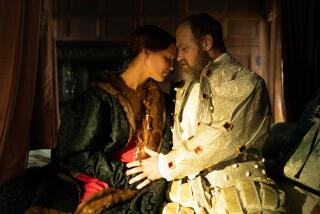
Review: Jude Law rages through ‘Firebrand’ as a mercurial royal while Alicia Vikander hangs on
June 14, 2024
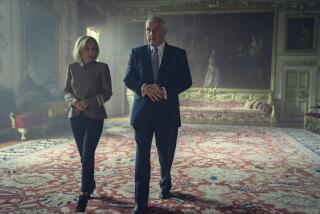
‘Scoop’ depicts Prince Andrew’s infamous interview. These were the women behind it
April 5, 2024

Kate’s remarkable video was a Royal revolution, scepter-spinning in its frankness
March 24, 2024
The biggest entertainment stories
Get our big stories about Hollywood, film, television, music, arts, culture and more right in your inbox as soon as they publish.
You may occasionally receive promotional content from the Los Angeles Times.
More From the Los Angeles Times

Sean ‘Diddy’ Combs’ $100-million sexual assault default judgment, explained
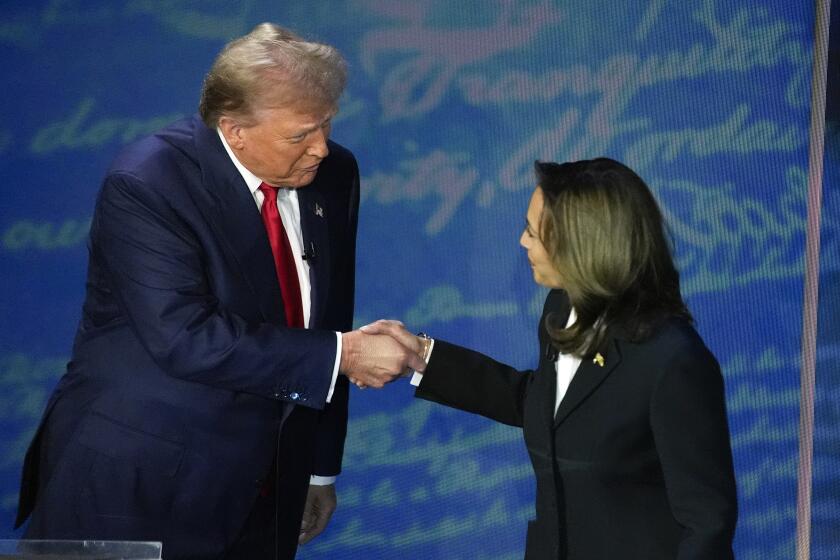
Hollywood Inc.
Trump-Harris presidential debate scores 67 million viewers

Woody Harrelson wants snacks, soft drinks at his cannabis cafe. He needs Newsom’s signature
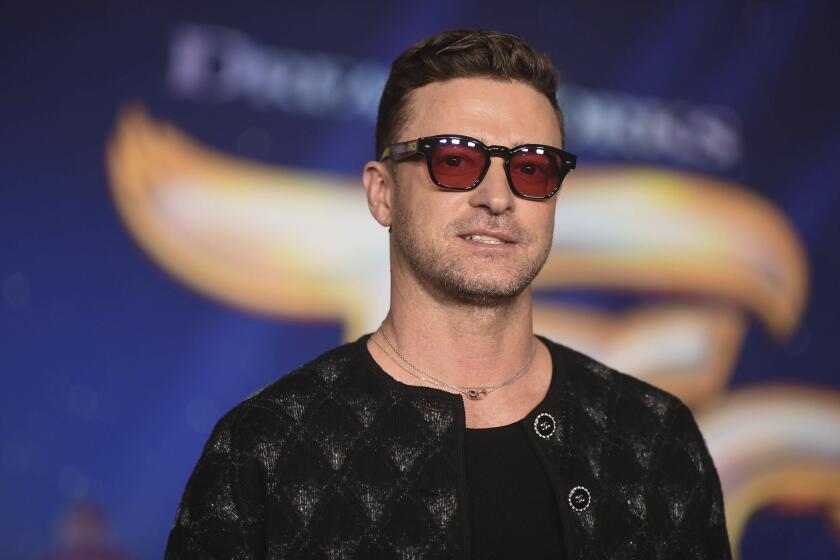
Justin Timberlake reportedly reaches plea deal in DWI case ahead of Hamptons hearing
Sept. 11, 2024
King's Speech, The (United Kingdom, 2010)
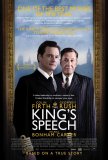
The King's Speech delivers solid drama with a rousing climax - a fully satisfying and uplifting period piece that achieves its dramatic potential without sacrificing historical accuracy. Unless you count Hitler, who is seen from afar, the narrative is villain-free, allowing the focus to be on the internal and interpersonal struggles of the characters - a more rewarding approach than when a bad guy is invented to fill the need for a conventional conflict. Even though it is set against the backdrop of mid-20th century British royalty, there are no barriers to mainstream accessibility. The wealth of acting mined by director Tom Hooper may represent the best ensemble not only of this year but of the last several years. Big and small, there are some astounding performances here.
The film opens in 1925. The man who will become King George VI (Colin Firth) is now merely Prince Albert. His official title is the Duke of York and, because he's the second son of King George V (Michael Gambon), he is not expected to ascend to the throne because that role will fall to his older brother, Prince Edward (Guy Pearce). A life away from the relentless attention of Buckingham Palace is suitable for Albert and his wife, Elizabeth (Helena Bonham Carter), who do not desire to be king and queen. And there's another issue: royalty in the age of radio presents a unique challenge for Albert, who is afflicted with a stammer that hampers his ability to speak publically (and, at times, privately). In an attempt to be free of this impediment, he visits Lionel Logue (Geoffrey Rush), a speech therapist known for unorthodox methods. Logue's importance in Albert's life escalates when circumstances conspire to make him the king of England at a time when the storm clouds of World War II are gathering on the horizon.
Although The King's Speech is primarily a drama and can be seen as a buddy movie and an instance of the underdog triumphant, there are plenty of humorous moments. None of the comedy is overdone or out-of-place. One can easily imagine, for example, the amusing awkwardness that would affect a middle-class wife upon discovering the Duchess of York sitting at her modest dining room table. The King's Speech is as positive and life-affirming as any recent movie. Like a sports figure who overcomes incredible odds to score the winning points, King George VI is presented as a man who, through sheer force of will and because of the trust he places in Lionel, is able to surmount the obstacle that blocks his path. Too frequently, we leave movies largely unmoved by the experience; The King's Speech sends viewers home with smiles on their faces and lilts in their hearts.
Rarely have we observed so many fantastic performances in one movie. First and foremost is Colin Firth who may win the Oscar (and, if he doesn't, he should). Perhaps the best way to describe the way Firth inhabits the character is to recall Helen Mirren's astounding turn in The Queen . It's the same sort of thing - a man who sheds his skin and crawls inside that of another so fully that we believe in the character. Geoffrey Rush, with his hangdog face, is the perfect foil for Firth. Rush gives Lionel a false bravado to cover his inner uncertainty about serving such a distinguished client. Beneath the seemingly confident exterior, we see the softer, gentler man. Firth and Rush share strong chemistry, which is critical in any buddy film, irrespective of how offbeat it may be. There's also no shortage of chemistry between Firth and Helena Bonham Carter, whose Elizabeth is a delight. She's sharp-witted and whip-smart but capable of great caring and humanity.
The secondary cast is populated by notable names giving sterling performances. There's Timothy Spall, whose interpretation of Winston Churchill is more than an exercise in mimicry. Derek Jacobi, who played a famous stammerer as the title character in I, Claudius , is the cranky and propriety-conscious Archbishop Lang. The royal family is filled out by Michael Gambon as George V, Claire Bloom as his wife, Queen Mary, and Guy Pearce as Edward, whose infatuation with a twice-divorced American woman creates problems for his reign. Finally, Jennifer Ehle's participation as Lionel's wife allows her an opportunity to be reunited with her Pride and Prejudice co-star, Firth. This is the first time they have shared the screen since that monumental mini-series.
The final scene, which gives the movie its title, represents not only the climax of the story but the moment in which all the elements come together - Firth and Rush's acting; the classical strains of the score; the stark simplicity of the production design (the room in which the speech is given is functional and unadorned). Hooper orchestrates everything with flawless diction in his cinematic language. The microphone looms not merely as an aid to voice amplification and recording, but as an implacable enemy - the faceless foe George VI must defeat by exorcising his own personal demons. It's an amazing moment.
The MPAA, in its infinite wisdom, has chosen to saddle The King's Speech with an R rating, believing there are too many "fucks." Jack Nicholson got away with 2.5 gratuitous "fucks" in How Do You Know, but that inferior picture survived with a PG-13. Admittedly, there are more than 2.5 "fucks" in The King's Speech (as are there in this now R-rated review), but they are anything but gratuitous. They serve a purpose within the context of speech therapy. The MPAA has once again shown its narrow-mindedness. Those "fucks" are the only reason this is R-rated. There's no sex or violence, just one word spoken a few too many times.
The King's Speech is everything a good movie should be. When the two hour running time expires, many will wish there were more minutes to come. With its deceptively complex drama, skillful direction and polished screenplay, and top-notch acting, The King's Speech illustrates by example how disappointingly lacking so many recent would-be dramas have been. This is a deeply human story that touches the heart and inspires the audience not only in relation to the characters and their circumstances but as a reminder that, in the dreary muddle of 2010's mediocrity, a motion picture like this can still make it to theaters.
Comments Add Comment
- Cider House Rules, The (1999)
- Citizen Kane (1941)
- War Zone, The (1999)
- Hole in My Heart, A (2005)
- Neon Demon, The (2016)
- Showgirls (1995)
- Pride & Prejudice (1996)
- English Patient, The (1996)
- Bridget Jones' Diary (2001)
- Then She Found Me (2008)
- Circle of Friends (1995)
- Last Legion, The (2007)
- Paradise Road (1997)
- Ides of March, The (2011)
- Backbeat (1969)
- Greatest, The (2010)
- Pride and Glory (2008)
- Harry Potter and the Order of the Phoenix (2007)
- Good Shepherd, The (2006)
- Harry Potter and the Deathly Hallows Part 2 (2011)
- Toys (1992)
- Sleepy Hollow (1999)
- Amazing Grace (2007)
- Skip to main content
- Keyboard shortcuts for audio player

Movie Interviews
- LISTEN & FOLLOW
- Apple Podcasts
- Amazon Music
Your support helps make our show possible and unlocks access to our sponsor-free feed.
Tom Hooper: On Directing 'The King's Speech'

In The King's Speech , Colin Firth plays King George VI, who was adored by his subjects for refusing to leave London during World War II bombing raids. He also suffered from a terrible stammer and hated speaking in public. Laurie Sparham via The Weinstein Co. hide caption
In The King's Speech , Colin Firth plays King George VI, who was adored by his subjects for refusing to leave London during World War II bombing raids. He also suffered from a terrible stammer and hated speaking in public.
This interview was originally broadcast on November 18, 2010. The King's Speech was recently nominated for 12 Academy Awards, including Best Picture and Best Director.
In 1925, Albert, Duke of York, began seeing a speech therapist to correct his pronounced speech impediment. Eleven years later, he reluctantly ascended to the British throne as King George VI, after his older brother Edward VIII abdicated to marry the American Wallis Simpson.
As the king, George VI was expected to frequently address his nation, both in person and on the radio. During these public speaking engagements, he continued to rely heavily on his speech therapist, Australian Lionel Logue, to make sure he didn't stammer.
King George VI's relationship with Logue is at the heart of director Tom Hooper's historical drama, The King's Speech . The film stars Colin Firth as King George VI and Geoffrey Rush as Logue, who developed his somewhat unorthodox way of treating speech impediments while treating shell-shocked soldiers in the years following World War I.

Related NPR Stories
Oscars 2011: the 83rd annual academy awards, oscars 2011: best picture cheat sheet, talk of the nation, 'the king's speech' passes stutterers the mic, movie reviews, for a 'king's speech,' commoner helps find a voice.
"He basically taught himself through trial and error speech therapy and developed techniques in order to help these men," says Hooper. "Our film suggests that what he felt was that these young men had lost faith in their voice and he was giving them the right to be heard again — to talk about their trauma and to find their voice again."
Hooper tells Fresh Air 's Dave Davies that Logue's therapy techniques included asking his subjects personal questions about their childhoods and about traumatic moments in their lives, to see if there was a psychological reason for their stammers. King George VI, who was often neglected by his nannies and rarely saw his parents, worked with Logue on techniques to regain his own voice.

Tom Hooper directed BBC costume drama before making his feature film debut in 2004, when he directed Hilary Swank in Red Dust . Laurie Sparham via The Weinstein Co. hide caption
Tom Hooper directed BBC costume drama before making his feature film debut in 2004, when he directed Hilary Swank in Red Dust .
"What I learned about stammering was that, when as a young child you lose the confidence of anyone who wants to listen to you, you lose confidence in your voice and the right to speech," says Hooper. "And a lot of the therapy was saying, 'You have a right to be heard.' "
Hooper explains that for the film, both he and Firth watched hours of archival footage of King George, to develop the character.
"We watched a speech given in 1938 where the newsreel people cut from a close-up [of the king] to spectators in the crowd," says Hooper. "Whenever they come back in this profile close to the king, you just can see in his eyes — he just wants to get it right. That's all he wants to achieve. But he keeps getting caught in these horrible, painful silences in which he drowns and gathers his thoughts in silence. Colin and I both saw this and were extremely moved."
Hooper received Emmy Awards for Outstanding Directing for the HBO miniseries John Adams and Elizabeth I . His other films include Damned United and Red Dust .
- Issue Archive
- Stay Connected
Review: The King's Speech
By Scott Foundas in the November-December 2010 Issue
“In the past, all a king had to do was look good in uniform,” observes King George V (Michael Gambon)—the first British monarch to address his subjects via radio—early on in Tom Hooper’s splendid period drama The King’s Speech . “Now we must invade people’s homes and ingratiate ourselves,” he continues. “We’ve become actors!” And this was 1934, three decades before the landmark BBC television documentary Royal Family brought the House of Windsor even closer to the people, and five before Lady Diana Spencer irrevocably blurred the line between commoner and royal, princess and pop icon. George V’s comments are directed at his youngest son, Albert Frederick Arthur George (Colin Firth), who will soon be thrust upon the throne just as England readies to enter World War II. But unlike his sober, stentorian-voiced father, the eventual George VI (father of Queen Elizabeth II) is hopelessly tongue-tied when it comes to public speaking, the victim of an acute stammer that turns ordinary conversation into a humiliating succession of false starts and too-long pauses.
If The King’s Speech risks being too cute by half in its depiction of how this royal without a voice comes to find one in his nation’s hour of need, Hooper and screenwriter David Seidler neatly avoid that trap by training their sights on a much bigger subject—namely, how the wireless waves of radio affected seismic changes to the nature of politics and society at large, turning public figures into performers, and narrowing the distance between classes. Yet amidst all the ballyhoo about Hooper’s film as The Social Network ’s chief rival for Oscar gold, few if any have noted the extent to which the two movies orbit a similar central theme—two portraits of a communications revolution, separated by a century.
We first see the king-to-be (then Duke of York) freezing at the mic during his closing speech of the 1925 Empire Exhibition at Wembley. After being subjected to a succession of useless therapies by a series of royal quacks, the Duke takes a grudging chance on one Lionel Logue (Geoffrey Rush), an Australian-born amateur actor and self-taught speech therapist with no credentials other than his own track record. What follows suggests a role-reversal My Fair Lady , with the lowly Antipodean coaching the aristocrat through measures (rolling around on the ground, shouting streams of obscenities) that have more in common with radical psychotherapy than conventional speech pathology.
Conducting the sessions in a draughty basement room with unfinished walls, Logue adds insult to injury by asking His Royal Highness leading questions about his childhood—an inventory of other forcibly corrected “defects,” including left-handedness and knock knees—and calling him by his family nickname, “Bertie.” (He insists that, in order for the treatment to work, the two men must regard each other as equals.) Their back-and-forth repartee, courtesy of Seidler (a septuagenarian Hollywood vet whose most notable prior credit was on Francis Coppola’s Tucker: The Man and His Dream ), is as sharp as anything this side of Aaron Sorkin. Even sharper, arguably, is the film’s sense of the high value placed on normalcy in a society with little tolerance for disability and aberration.
These are the sort of plum roles that can all too easily turn into smoked ham, but Firth and Rush manage them with an ideal balance of flourish and restraint. Hooper, who has become something of a specialist in exhuming British history from the mothballs of Masterpiece Theatre —his credits include Elizabeth I (05) and the masterful Longford (06), as well as The Damned United (09)—does so again, shooting in long takes and exaggerated wide angles that amplify Bertie’s mounting sense of uncertainty as he finds the weight of the world—and so many words—upon his shoulders.
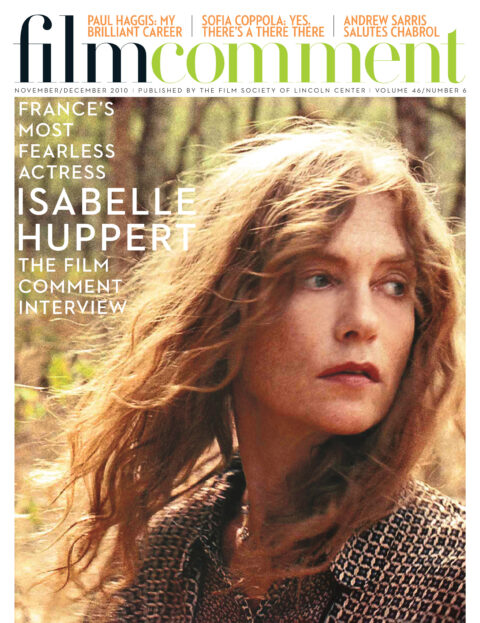
The Film Comment Podcast: The Rebel’s Cinema—Frantz Fanon on Screen #1

The Rebel’s Cinema: Frantz Fanon on Screen

Prison Movie Wives’ Black Heart Movie Diary

“I am innocent because I am innocent”

Sign up for the Film Comment Letter!
Thoughtful, original film criticism delivered straight to your inbox each week. Enter your email address below to subscribe.
The rain in Sp…Sp…Sp…
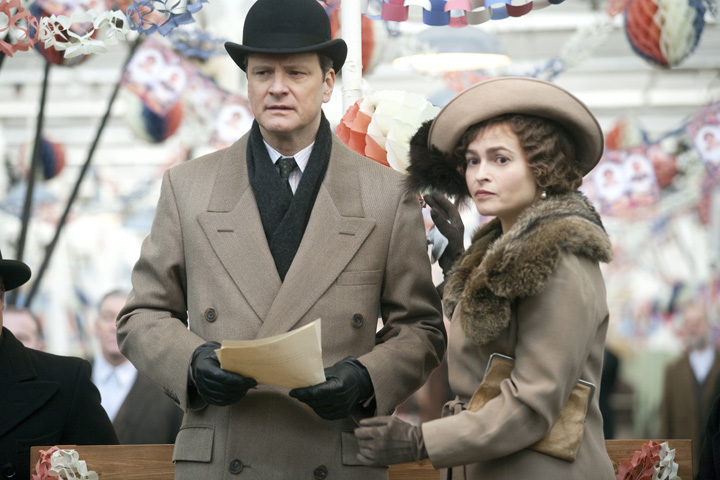
Colin Firth and Helena Bonham Carter.
“The King’s Speech” tells the story of a man compelled to speak to the world with a stammer. It must be painful enough for one who stammers to speak to another person. To face a radio microphone and know the British Empire is listening must be terrifying. At the time of the speech mentioned in this title, a quarter of the Earth’s population was in the Empire, and of course much of North America, Europe, Africa and Asia would be listening — and with particular attention, Germany.
The king was George VI. The year was 1939. Britain was entering into war with Germany. His listeners required firmness, clarity and resolve, not stammers punctuated with tortured silences. This was a man who never wanted to be king. After the death of his father, the throne was to pass to his brother Edward. But Edward renounced the throne “in order to marry the woman I love,” and the duty fell to Prince Albert, who had struggled with his speech from an early age.
In “The King’s Speech,” director Tom Hooper opens on Albert ( Colin Firth ), attempting to open the British Empire Exhibition in 1925. Before a crowded arena and a radio audience, he seizes up in agony in efforts to make the words come out right. His father, George V ( Michael Gambon ), has always considered “Bertie” superior to Edward ( Guy Pearce ), but mourns the introduction of radio and newsreels, which require a monarch to be seen and heard on public occasions.
At that 1925 speech, we see Bertie’s wife, Elizabeth (Helena Bonham Carter), her face filled with sympathy. As it becomes clear that Edward’s obsession with Wallis Simpson (Eve Best) is incurable, she realizes her Bertie may face more public humiliation. He sees various speech therapists, one of whom tries the old marbles-in-the-mouth routine first recommended by Demosthenes. Nothing works, and then she seeks out a failed Australian actor named Lionel Logue ( Geoffrey Rush ), who has set up a speech therapy practice.
Logue doesn’t realize at first who is consulting him. And one of the subjects of the film is Logue’s attitude toward royalty, which I suspect is not untypical of Australians; he suggests to Albert that they get on a first-name basis. Albert has been raised within the bell jar of the monarchy and objects to such treatment, not because he has an elevated opinion of himself but because, well, it just isn’t done. But Logue realizes that if he is to become the king’s therapist, he must first become his friend.
If the British monarchy is good for nothing else, it’s superb at producing the subjects of films. “The King’s Speech,” rich in period detail and meticulous class distinctions, largely sidesteps the story that loomed over this whole period, Edward’s startling decision to give up the crown to marry a woman who was already divorced three times. Indeed, the Duke and Duchess of Windsor (as they became) would occupy an inexplicable volume of attention for years, considering they had no significance after the Duke’s abdication. The unsavory thing is that Wallis Simpson considered herself worthy of such a sacrifice from the man she allegedly loved. This film finds a more interesting story about better people; Americans, who aren’t always expert on British royalty, may not necessarily realize that Albert and wife Elizabeth were the parents of Queen Elizabeth II. God knows what Edward might have fathered.
Director Tom Hooper makes an interesting decision with his sets and visuals. The movie is largely shot in interiors, and most of those spaces are long and narrow. That’s unusual in historical dramas, which emphasize sweep and majesty and so on. Here we have long corridors, a deep and narrow master control room for the BBC, rooms that seem peculiarly oblong. I suspect he may be evoking the narrow, constricting walls of Albert’s throat as he struggles to get words out.
The film largely involves the actors Colin Firth, formal and decent, and Geoffrey Rush, large and expansive, in psychological struggle. Helena Bonham Carter, who can be merciless (as in the “Harry Potter” films), is here filled with mercy, tact and love for her husband; this is the woman who became the much-loved Queen Mother of our lifetimes, dying in 2002 at 101. As the men have a struggle of wills, she tries to smooth things (and raise her girls Elizabeth and Margaret). And in the wider sphere, Hitler takes power, war comes closer, Mrs. Simpson wreaks havoc, and the dreaded day approaches when Bertie, as George VI, will have to speak to the world and declare war.
Hooper’s handling of that fraught scene is masterful. Firth internalizes his tension and keeps the required stiff upper lip, but his staff and household are terrified on his behalf as he marches toward a microphone as if it is a guillotine. It is the one scene in the film that must work, and it does, and its emotional impact is surprisingly strong. At the end, what we have here is a superior historical drama and a powerful personal one. And two opposites who remain friends for the rest of their lives.
Note: The R rating refers to Logue’s use of vulgarity. It is utterly inexplicable. This is an excellent film for teenagers.

Roger Ebert
Roger Ebert was the film critic of the Chicago Sun-Times from 1967 until his death in 2013. In 1975, he won the Pulitzer Prize for distinguished criticism.
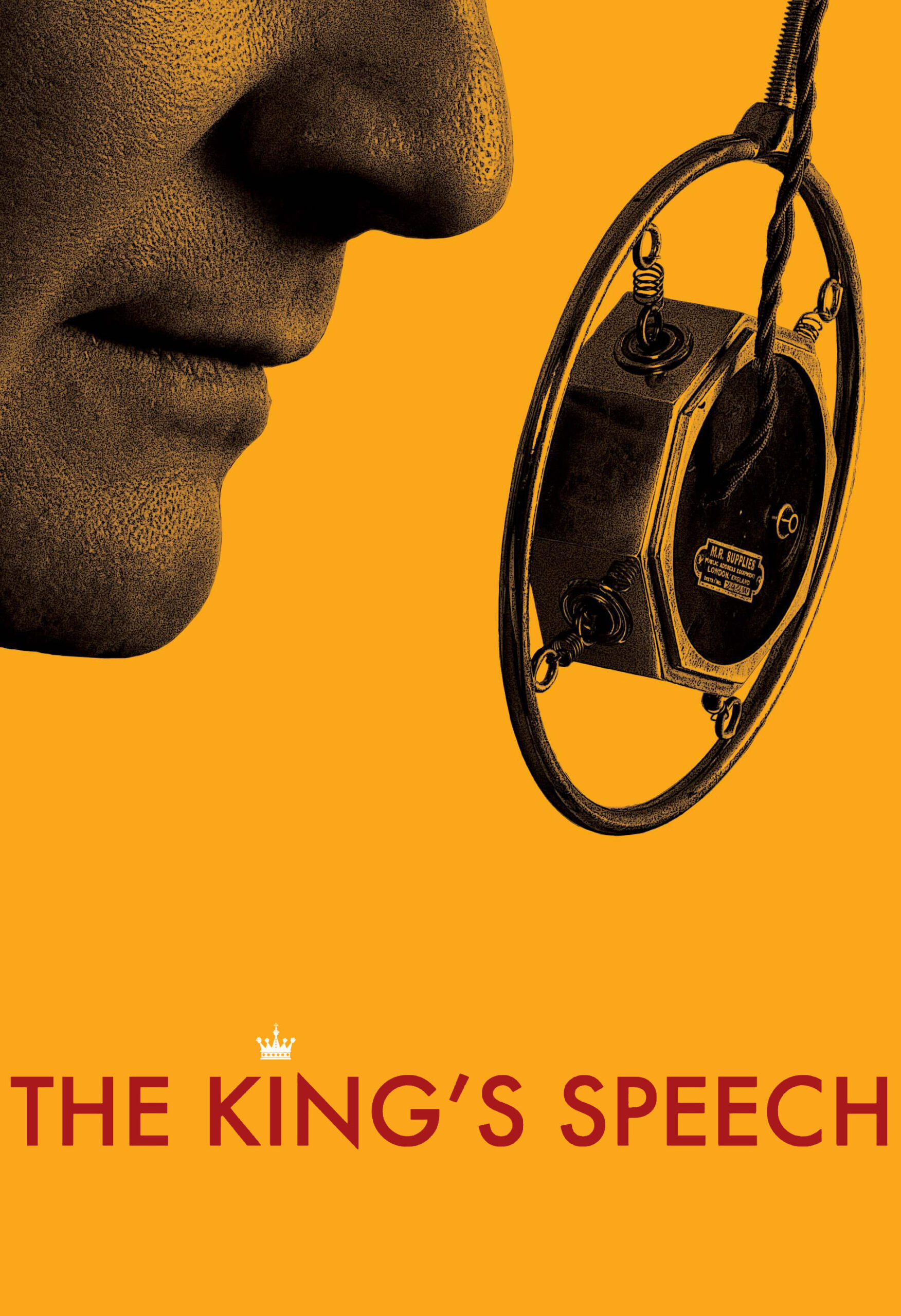
- David Seidler
Directed by
Leave a comment, now playing.

Megalopolis

The Last of the Sea Women
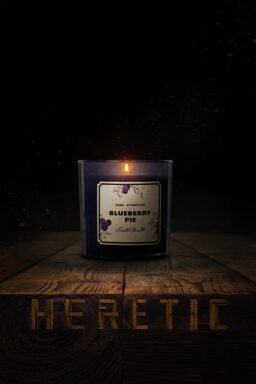
The Wild Robot
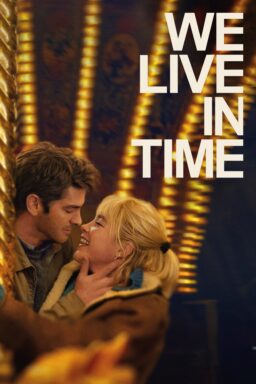
We Live in Time
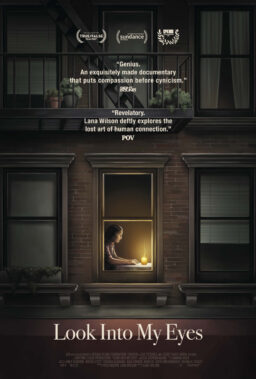
Look Into My Eyes

The Front Room
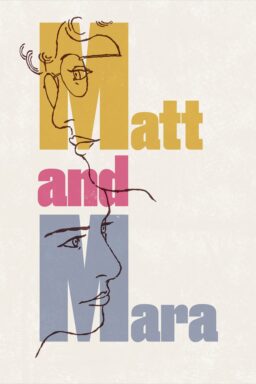
Matt and Mara
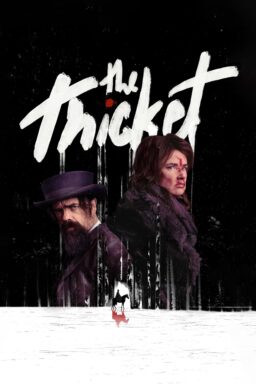
The Thicket
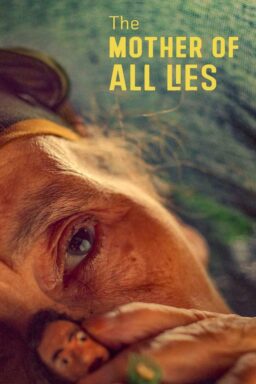
The Mother of All Lies
Latest articles.
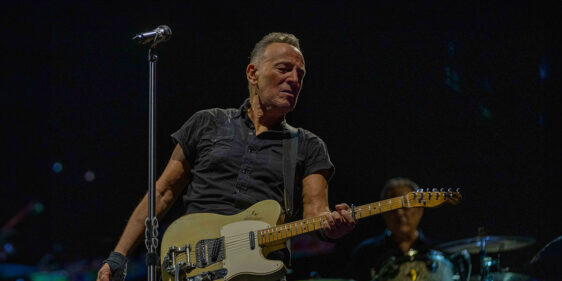
TIFF 2024: Road Diary: Bruce Springsteen and the E Street Band, Elton John: It’s Not Too Late, Paul Anka: His Way
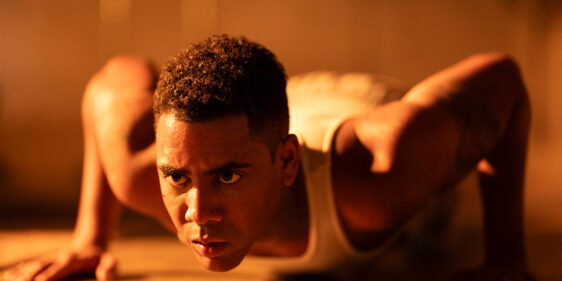
TIFF 2024: Unstoppable, Triumph, April

TIFF 2024: Table of Contents
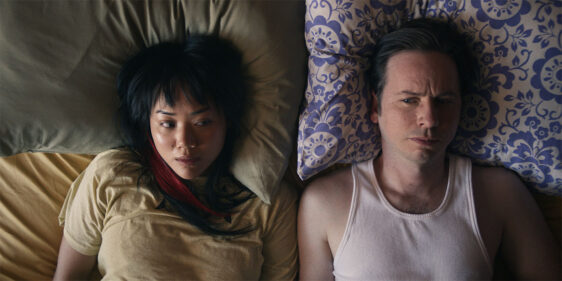
TIFF 2024: Paying For It, Viktor, Mr. K
The best movie reviews, in your inbox.
Share this on:
Review: 'the king's speech' delivers royally.
- "The King's Speech" is a crowning achievement powered by a dream cast
- Writer David Seidler had first conceived the story as a play
- Colin Firth gives a towering performance that deserves a shower of awards
( Rolling Stone ) -- It could have been a bunch of pip-pip, stiff-upper-lip Brit blather about a stuttering king who learns to stop worrying and love the microphone. Instead, "The King's Speech" -- a crowning achievement powered by a dream cast -- digs vibrant human drama out of the dry dust of history.
King George VI ( Colin Firth ) -- father of the present Queen Elizabeth -- found his own Dr. Strangelove in Lionel Logue (Geoffrey Rush), a wildly eccentric Australian speech therapist who made it possible for the stammering monarch to go on radio in 1939 and rally his subjects to support the declaration of war on Hitler's Germany.
Rolling Stone: Peter Travers reviews "The King's Speech" in his weekly video series, "At the Movies With Peter Travers"
"The King's Speech" plays out on the battlefield of words, not action. Writer David Seidler (doing keenly insightful work partly owing to his own bouts with a stammer) had conceived the story first as a play. Before you can think the words "static" and "confining," be advised that director Tom Hooper, garlanded with Emmy dust for "John Adams," "Elizabeth I," "Longford" and "Prime Suspect," breathes fresh, urgent life into every frame of this powerhouse. Hooper, 37, is a prodigious talent. The emotion this film produces is staggering.
Hooper begins in 1925, as the king, then merely Prince Albert, is trying to speak at the British Empire Exhibition. The words stick in his throat, and his silences between syllables fill the stadium. The prince's embarrassment is acute, and deeply felt by his compassionate wife, Elizabeth (a superb Helena Bonham Carter creates miracles with every subtle look and gesture), who goads him to visit Logue.
His Highness goes into heavy snob mode in the presence of this commoner, who demands that they use first names. When Lionel first calls Albert "Bertie," Firth's poleaxed reaction is priceless. Lionel treats speech lessons like therapy sessions, pushing for details about life in the royal family.
What he gets is a portrait of a blowhard father, George V (Michael Gambon), and a taunting brother, Edward VIII (Guy Pearce is absolutely stellar), who reduces the proud, vulnerable Albert to rubble by committing the one unforgivable sin: Edward abdicates the throne to marry American divorcee Wallis Simpson (Eve Best), leaving Bertie to succeed him. Suddenly, the man who would not be king most assuredly is.
Rolling Stone: Peter Travers' holiday movie preview: Ten movies for escapism this season
Firth's nuanced brilliance is a thing of bruised beauty. Oscar-nominated last year for " A Single Man ," he gives a towering performance that deserves a shower of awards. And Rush is his match, fiercely funny in the hilarious and heartfelt interactions between king and commoner. Lionel is a failed actor given to grand gestures, and Rush chows down on this feast of a role, jolting the movie to life.
Firth plays the counterpoint, the blue blood bred to hold it all together. It's uproarious to watch Lionel prod Bertie to lose his cool, forcing him to sing out a symphony of s**t-f***-b***er-me swearing (all stammer-free). Luckily, this release takes place in Lionel's home, where his wife and children are unaware of the royal patient.
The scene in which Lionel's wife, Myrtle (Jennifer Ehle), meets the king has a special poignancy, if you remember Ehle and Firth as lovers in TV's " Pride and Prejudice ."
"The King's Speech" doesn't have the budget to show coronations and pomp, but it misses nothing in resonant intimacy. Hooper, with a Brit father and Aussie mother, throws himself into the scene in which Lionel stands like a conductor in front of the king as he delivers the speech of his life. Two men alone create an epic landscape of feeling in one of the very best movies of the year.
Rolling Stone grade: 3 1/2 stars
Copyright © 2011 Rolling Stone .
Most Popular
Fine art from an iphone the best instagram photos from 2014, after ivf shock, mom gives birth to two sets of identical twins, inside north korea: water park, sacred birth site and some minders, 10 top destinations to visit in 2015, what really scares terrorists.
The King’s Speech: Good Movie, Bad History
With Colin Firth playing a royal with a stutter, The King's Speech is certain for Oscar magic, but Andrew Roberts says it gets the story all wrong and is simply bad history.

Andrew Roberts

Laurie Sparham / The Weinstein Company
The buzzy new movie, The King's Speech , is an affectionate portrait of Queen Elizabeth II's parents, Bertie, the Duke of York (later King George VI) and Elizabeth the Duchess of York (later the Queen Mother), told through the prism of the King's overcoming of his stammer. Starring Colin Firth as the king, Helena Bonham Carter as the queen, and Geoffrey Rush as the king's Australian speech therapist Lionel Logue, it also boasts a cast that includes Derek Jacobi, Michael Gambon, Timothy Spall, and Anthony Andrews. Yet before it is accepted as an accurate historical record of what happened to the Royal Family between 1925 and 1939, viewers should know of the very many glaring and egregious inaccuracies and tired old myths that this otherwise charming film unquestioningly regurgitates.
King's Speech Trailer
Of course Hollywood has long played fast and loose with history. As the clerihew goes:
Cecil B. de Mille Rather against his will Was persuaded to leave Moses Out of The Wars of the Roses.
But at a moment when, as a result of Prince William's engagement to Kate Middleton, many eyes will be turned onto the House of Windsor, it is as well to explode a few legends about the Prince's great-grandfather, George VI, the monarch who saw Britain through the Second World War. The first is the simple one that his stutter wasn't anything like as bad as the film depicts. In fact, it was relatively mild, and when he was concentrating hard on what he was saying it disappeared altogether. His speech to the Australian parliament in Canberra in 1927 was delivered without stuttering, for example. Yet in the movie it is so chronic that Colin Firth can hardly say a sentence without prolonged stuttering, right the way up to the outbreak of war in 1939. Of course, the whole premise of the movie is based on Logue's cure, but recordings of the Duke of York before he even met Logue make it clear that his problem was nothing like so acute as this film makes out.
Nor were the Duke and Duchess so pampered by courtiers that they could hardly work out how an elevator door worked, as is depicted in this movie. The Duke was mentioned in dispatches when as a midshipman he fought in a gun turret in the First World War battle of Jutland, mastering far more complex machinery than an elevator door; nor was the Duchess born royal. Similarly, Winston Churchill is shown as supporting the Abdication of George VI's elder brother King Edward VIII, whereas he violently opposed it. He is also depicted, along with the Archbishop of Canterbury Cosmo Gordon Lang and the Prime Minister Neville Chamberlain, as turning up to Buckingham Palace to witness the King's broadcast on the day war broke out in September 1939, as though they didn't have better things to do. A glance at Churchill's own memoirs would have put that screenwriters' myth to rest. Then a huge crowd gathers outside Buckingham Palace to congratulate the king on his speech, which is also completely fictitious.
As history it is worthless because of its addiction to long-exploded myths… Kate Middleton had better get ready for a lifetime of this.
The Duke would never, ever have sneered at the Australians to an Australian who was almost also a stranger, on one occasion calling Logue "a jumped-up jackaroo from the outback." The Royal family of those days understandably eulogized the British Empire that had so recently bled itself so white for King and Country in the Great War, and Bertie had happy memories of his very successful 1927 visit there. Nor did Edward VIII taunt his brother for his stutter, accusing him of wanting to usurp his throne and calling him "B-b-b-b-Bertie." They were close friends, and Edward well knew that Bertie wanted to be king-emperor as little as he. It was also quite wrong to suggest that their grandfather, Edward VII, wanted their father, George V, to "be frightened" of him. The two men were very close, indeed Edward VII brought George V's desk next door to his at Buckingham Palace so they could work together. Similarly, Queen Mary is depicted as a cold and heartless mother, yet it was on her lap that George VI went to cry during the Abdication.
• Andrew Roberts: The King Who Couldn’t Speak Several minor social bêtises—Wallis Windsor not curtseying to the Yorks, the Queen saying "Very nice to meet you" rather than "How do you do?," a private secretary speaking of "The Duke" rather than "His Royal Highness," and others—imply that the film could have done with an historical consultant. Even the ludicrous old lies about Joachim von Ribbentrop sending Wallis Windsor 17 red roses every day, and her working as a geisha in Shanghai, are trotted out to blacken her character and make the Yorks look better.
Tom Hooper, the director, has spoken of his disappointment that the film is rated 'R' because of the 15 or so F-words (as well as "bugger", "arse","balls", "willy", and so on) that the King is supposed to have said. 'What I take away from that decision," says Hooper, "is that violence and torture is OK, but bad language isn't.' Yet the swearing is so egregiously prolonged and unnecessarily repeated—and I suspect not fully justified historically either—that Hooper only has himself to blame.
The King's Speech is gorgeously produced—the depiction of a London "pea-souper" fog is excellent—and is bound to win many awards for the excellent acting of an all-star cast. But as history it is worthless because of its addiction to long-exploded myths, and for insights into the personalities of the key figures in the House of Windsor of the Twenties and Thirties it is less than worthless. Kate Middleton had better get ready for a lifetime of this.
Plus: Check out more of the latest entertainment, fashion, and culture coverage on Sexy Beast—photos, videos, features, and Tweets .
Historian Andrew Roberts ' latest book, Masters and Commanders , was published in the UK in September. His previous books include Napoleon and Wellington , Hitler and Churchill , and A History of the English-Speaking Peoples Since 1900 . Roberts is a fellow of the Royal Society of Literature and the Royal Society of Arts.
Got a tip? Send it to The Daily Beast here .
READ THIS LIST
In a critically and commercially disappointing year for the film industry, one of the few highlights has been the reception given to The King’s Speech . The movie has been nominated for just about every existing award, and a bevy of Oscar nominations are forthcoming. The period drama is also on its way to financial success.
Like Stephen Frears’s film from 2006, The Queen —which won Helen Mirren an Oscar for her eponymous performance— The King’s Speech is a testament to Americans’ continuing fascination with the British Royal Family. But, unlike The Queen , which was merely simplistic in its portrayal of the monarchy, The King’s Speech is historically inaccurate, entirely misleading, and, in its own small way, morally dubious.
The film tells the story of King George VI (Colin Firth) and his battle with a speech impediment. Bertie, as he was known, seeks the help of a speech therapist (played by Geoffrey Rush), and the two spend most of the film—differences in social status be damned—bonding. By the time the credits roll, Bertie has conquered his stammer, and the British people are well on their way to vanquishing fascism—the latter, naturally, having been aided by the former, thanks to an inspiring royal address from Buckingham Palace after the German invasion of Poland. This heartwarming tale plays out predictably and unsubtly— The King’s Speech is one of those films that is not content to show us a friendship developing over two hours; no, the characters must also tell us how much the friendship means to them.
The only reason that Bertie managed to ascend to the throne in the first place was that his older brother, David (aka Edward VIII), decided to abdicate so he could marry a Baltimore divorcee by the name of Wallis Simpson. In the film, Edward VIII (nicely played by Guy Pearce) is presented as childish and cruel to his brother (which no doubt he was). And, as a way of presenting his political views, we see him make a single foolish comment about the Nazis. What the film never mentions is that Edward VIII was an ardent admirer of Hitler and of fascism, and a proponent of appeasement long after Germany moved onto Polish soil and hostilities began in earnest. Edward lived in continental Europe with Simpson after abdicating; following the German invasion of France, he absurdly asked the Nazis to look after his house. Eventually, the British government convinced the couple to move to the Bahamas, where he became governor. The idea was to keep the pair far away from the Nazis so as to prevent Edward from cutting any deals with Hitler. The last we see of Edward and Simpson in the film is when they listen to Bertie’s big speech. (There is a beach in the background but the viewer has no idea where they are.)
By shortchanging the danger that Edward posed to Britain, the viewer is likely to believe he was no more than a ridiculous and self-indulgent brat. But he isn’t the only character who is sanitized in the movie. First, there is Winston Churchill, played by Timothy Spall in a small role. Spall’s crucial scene takes place after the Simpson affair has become known. Churchill counsels Bertie and reports his (Churchill’s) dismay at the way Edward is behaving. This will come as news to historians because Churchill—astonishingly—supported Edward throughout the abdication crisis. His grandstanding on the issue even shocked his allies, who couldn’t believe that he would risk his political comeback to support an appeaser and fascist like Edward. Most likely because of Churchill’s historical standing, the film simply omits all of this and assigns the heroic war leader the opposite position to the one he actually held.
Bertie himself is also romanticized. He is seen presciently raising the question of German aggression before the invasion of the Sudetenland. Edward waves off Bertie’s warning, and, the next time we are instructed to focus on political questions, the King is heroically rallying his people to the battle against fascism. The film leaves out what happened in the intervening period.
Bertie ascended to the throne at the end of 1936. Three years later, he gives the speech of the film’s title. In the time between these two events, the British government notoriously blundered and appeased the Nazis, most famously at Munich. Less well-remembered is that after Prime Minister Chamberlain returned from giving away a chunk of Europe to the Germans, he was immediately invited to Buckingham Palace to appear on the balcony with the King and Queen (the latter is now better known as the recently departed but beloved “Queen Mum”). This was both a violation of protocol—the Royals are supposed to stay out of politics—and an extraordinary endorsement of a prime minister whose foreign policy was disastrous. Much of the Labour Party was rightly furious. This despicable historical fact is less well-known than it should be, but the film fails twice—first, by not showing it at all, and, second, by implying that Bertie was staunchly anti-fascist from the start.
The strange unwillingness of The King’s Speech to mention any of this is at least somewhat surprising for one reason: The actual arc of George VI’s character would make a fine and interesting movie. Just think: A king fights against a stutter and his dastardly, treasonous brother, while eventually sloughing off his old instincts for appeasement. He even overcomes his distaste for Winston Churchill—the politician who bent over backward for that very same brother—and lends his steadfast support to Churchill’s aggressive policy against fascism.
Why wasn’t this story told? The likely answer is that even highbrow critics and audiences love to toast the House of Windsor. While the Royal Family may frequently appear more tawdry than anything else, cheap American Anglophilia can always be counted on to provide thunderous applause. Take The Queen . Unlike The King’s Speech , that movie was witty and compelling. But it also presented the Princess Diana phenomenon with a complete lack of distance. Viewers who wondered why the Western world came to a halt for two weeks solely because of an unexceptional woman’s death were unlikely to find any answers from the movie. Now, The King’s Speech has taken things a step further by not only simplifying its story but grossly misrepresenting real events and people. Apparently, the life of George VI had too many shades of gray for a mainstream film.
Isaac Chotiner is the executive editor of The Book.

- History & Society
- Science & Tech
- Biographies
- Animals & Nature
- Geography & Travel
- Arts & Culture
- Games & Quizzes
- On This Day
- One Good Fact
- New Articles
- Lifestyles & Social Issues
- Philosophy & Religion
- Politics, Law & Government
- World History
- Health & Medicine
- Browse Biographies
- Birds, Reptiles & Other Vertebrates
- Bugs, Mollusks & Other Invertebrates
- Environment
- Fossils & Geologic Time
- Entertainment & Pop Culture
- Sports & Recreation
- Visual Arts
- Demystified
- Image Galleries
- Infographics
- Top Questions
- Britannica Kids
- Saving Earth
- Space Next 50
- Student Center

The King’s Speech
Learn about this topic in these articles:, assorted references.

…captured in the motion picture The King’s Speech (2010), which depicts his long-term relationship with the unconventional Australian speech therapist Lionel Logue and climaxes with the king’s inspiring live radio address on September 3, 1939, as Britain entered World War II.
- Oscar for best picture, 2010
- Oscar to Firth for best actor, 2010
- Oscar to Hooper for best director, 2010

…Unchained (2012), the historical drama The King’s Speech (2010), the silent-film homage The Artist (2011), and The Imitation Game (2014), a biopic about Alan Turing.

…Firth’s King George VI in The King’s Speech (2010). She subsequently appeared on-screen as Miss Havisham in a 2012 adaptation of Charles Dickens’s Great Expectations , as the vicious Mme Thénardier in a 2012 film version of the musical Les Misérables , and as an Old West brothel owner in The Lone…

…acclaim with the historical drama The King’s Speech (2010), starring as Prince Albert (eventually King George VI) of Great Britain, who enlists the aid of an eccentric speech therapist (played by Geoffrey Rush) to overcome a debilitating stutter. Firth garnered numerous accolades for his poignant performance, including an Academy Award…

…England in the film drama The King’s Speech ; Rush earned an Academy Award nomination for best supporting actor. He was also lauded for his comparatively muted performance in the World War II drama The Book Thief (2013), in which he played a German man who, with his wife, shelters an…
Biopics are one of the most popular genres of movies, and these 10 biopics were incredibly inaccurate - but they are still really good. Accuracy is often one of the most important things in biopics, as viewers frequently view these types of films in an attempt to learn more about their real-life subjects. Thus, when a biopic is inaccurate, the inaccuracy is oftentimes the biggest criticism of the film. However, this isn't always the case, as these 10 biopics managed to be fantastic despite not exactly telling the story in a completely accurate way.
British movie and TV director Tom Hooper broke into the industry at the tender age of 18 when he made his first professional short film Painted Faces which was sold to Channel 4 and screened at the London Film Festival. While studying at Oxford University, Hooper directed actresses Kate Beckinsale and Emily Mortimer in plays by Frank Miller and Franz Kafka and later directed episodes of British shows like Eastenders , Byker Grove and Cold Feet .
2010 was one of the finest years in history for cinema. With the era of classic films longin the past, the film industry seemsto have spent a long time trying to relive the heyday of exciting, tense, character-driven stories in every genre. In the 70s, horror wasnt just about jump scares and comedy wasnt just fart jokes. 2010 allowed as a brief moment to relive what used to make cinema great.
It was thanks to Steven Spielberg and George Lucas that the rating of PG-13 was added to MPAA ratings in 1984.It was due to a little film called Indiana Jones and the Temple of Doom, starring Harrison Ford and Kate Capshaw, that an uproar (over the films then PG rating) ensued due to the film's violence (and the fact it wasn't not rated R).
Summer might be just around the corner, but with so many great shows and movies coming to Netflix in June 2018, cinephiles might just be hoping for a few more rainy days.
UPDATE: Well the Oscars are over and we nailed it in all except two categories with our predictions. Check out the full list of Oscar Winners 2011 .
Screen Rant's Ben Kendrick Reviews The King's Speech
We've spent the last few days carrying on about the worst films of 2010 and the biggest disappointments in the hopes of healing our and your collective psyches from the damage sustained after watching inane movies like Jonah Hex or Furry Vengeance (*shudder*).
Watch CBS News
The story behind "The King's Speech"
June 12, 2011 / 8:47 PM EDT / CBS News
This story was first published Feb. 20, 2011. It was updated on June 12, 2011.
Last winter, "The King's Speech" dominated the Oscars when it took home four out of the 12 Academy Awards it was nominated for - including best picture, best director, best actor and best original screenplay.
The movie is based on the true story of George VI, the father of the present queen of England. George VI was a man who, in the 1930s, desperately did not want to be king. He was afflicted nearly all his life by a crippling stammer which stood to rob Britain of a commanding voice at the very moment that Hitler rose to threaten Europe.
The story struck a nerve with audiences and critics alike, as we reported last February, just before Colin Firth won his first Oscar for his critically-acclaimed portrayal of George VI.
The hidden letters Dig into the treasure trove of historic letters between a stuttering king and his commoner friend, speech therapist Lionel Logue.
When correspondent Scott Pelley asked Firth if he liked being king, Firth said, "I think it's hard to think of anything worse, really. I mean, I wouldn't change places with this man. And I would be very surprised if anybody watching the film would change places with this man."
"It's a perfect storm of catastrophic misfortunes for a man who does not want the limelight, who does not want to be heard publicly, who does not want to expose this humiliating impediment that he's spent his life battling," Firth explained. "He's actually fighting his own private war. He'd rather have been facing machine gun fire than have to face the microphone."
The microphone hung like a noose for the king, who was a stutterer from the age of 8. He was never meant to be king. But in 1936 his older brother gave up the throne to marry Wallace Simpson, a divorced American. Suddenly George VI and his wife Elizabeth reigned over an empire that was home to 25 percent of the world's population.
And like the George of over 1,000 years before, he had a dragon to slay: radio.
Extra: The real King George Extra: Colin Firth, King and Queen Extra: Firth's Oscar-nominated roles Extra: Firth's "bland" looks Pictures: Colin Firth on "60 Minutes"
"When I looked at images of him or I listened to him, you do see that physical struggle," Firth said of the king's public speeches. "His eyes close, and you see him try to gather himself. And it's heartbreaking."
Among those listening was a 7-year-old British boy who, like the king, had a wealth of words but could not get them out.
"I was a profound stutterer. I started stuttering just before my third birthday. I didn't rid myself of it until I was 16. But my parents would encourage me to listen to the king's speeches during the war. And I thought, 'Wow if he can do that, there is hope for me.' So he became my childhood hero," David Seidler, who wrote the movie, told Pelley.
Seidler had grown up with the story, but he didn't want to tell the tale until he had permission from the late king's widow, known as The Queen Mother.
Seidler had sent a letter to her. "And finally, an answer came and it said, 'Dear Mr. Seidler, please, not during my lifetime the memory of these events is still too painful.' If the Queen Mum says wait to an Englishman, an Englishman waits. But, I didn't think I'd have to wait that long," he explained.
Asked why, Seidler said, "Well, she was a very elderly lady. Twenty-five years later, just shy of her 102nd birthday, she finally left this realm."
After the Queen Mother's death in 2002, Seidler went to work. He found the theme of the story in the clash between his royal highness and an Australian commoner who became the king's salvation, an unknown speech therapist named Lionel Logue.
"The words that keep coming up when you hear about Lionel Logue are 'charisma' and 'confidence.' He would never say, 'I can fix your stuttering.' He would say, 'You can get a handle on your stuttering. I know you can succeed,'" Seidler said.
Geoffrey Rush plays Logue, an unorthodox therapist and a royal pain.
They say you can't make this stuff up, and in much of the film that's true. Seidler could not have imagined his work would lead to a discovery that would rewrite history. Researchers for the film tracked down Lionel Logue's grandson Mark, because the movie needed family photos to get the clothing right.
Mark Logue not only had pictures, he also had some diaries.
His grandfather's diaries were up in the attic in boxes that the family had nearly forgotten. When Logue hauled them down for the movie, he discovered more than 100 letters between the therapist and his king.
"'My dear Logue, thank you so much for sending me the books for my birthday, which are most acceptable.' That's so British isn't it. 'Yours very sincerely, Albert,'" Logue read from one of the letters.
"As you read through all these letters between your grandfather and the king, what did it tell you about the relationship between these two men?" Pelley asked.
"It's not the relationship between a doctor and his patient, it's a relationship between friends," Logue said.
We met Logue at the same address where his grandfather treated the king. And among the hundreds of pages of documents were Logue's first observations of George VI.
"Probably the most startling thing was the king's appointment card," Logue told Pelley. "It described in detail the king's stammer, which we hadn't seen anywhere else. And it also described in detail the intensity with the appointments."
The king saw Lionel Logue every day for an hour, including weekends.
"You know, he was so committed. I think he decided 'This is it. I have to overcome this stammer, and this is my chance,'" Mark Logue told Pelley.
In the film, the king throws himself into crazy therapies. But in truth, Logue didn't record his methods. The scenes are based on Seidler's experience and ideas of the actors.
"We threw in stuff that we knew. I mean, somebody had told me that the only way to release that muscle," actor Geoffrey Rush said of one of the speech exercises he did in the movie. "And of course, little did I realize that the particular lens they were using on that shot made me look like a Galapagos tortoise."
While the treatments spring from imagination, the actors read Logue's diaries and letters to bring realism to everything else.
"The line at the end, I found reading the diaries in bed one night, 'cause this is what I used to do every night, when Logue says 'You still stammered on the 'W'," Firth said.
The line was used in the movie.
"It shows that these men had a sense of humor. It showed that there was wit. It showed there was self mockery and it just showed a kind of buoyancy of spirit between them. The fact that he spoke on a desk standing upright in this little hidden room is something we found in the diaries as well," Firth told Pelley.
"In reality he had to stand up to speak, he had to have the window open," Firth said. "And he had to have his jacket off."
"And that wonderful, specific little eccentric observation that came from reality," Firth added.
One of the most remarkable things to come out of the Logue attic was a copy of what maybe the most important speech the king ever made - the speech that gave the movie its name. This was the moment when King George VI had to tell his people that for the second time in a generation they were at war with Germany. The stakes were enormous. The leader of the empire could not stumble over these words.
Mark Logue has the original copy of "the speech," typed out on Buckingham Palace stationary.
"What are all of these marks? All these vertical lines? What do they mean?" Pelley asked, looking over the documents.
"They're deliberate pauses so that the king would be able to sort of attack the next word without hesitation," Logue said. "He's replacing some words, he's crossing them out and suggesting another word that the king would find easier to pronounce."
"Here's a line that he's changed, 'We've tried to find a peaceful way out of the differences between my government.' He's changed that from, 'my government,' to, 'the differences between ourselves and those who would be our enemies,'" Pelley said.
"You know, I'm curious. Have either of you snuck into a theater and watched the film with a regular audience?" Pelley asked Firth and Rush.
"No, the only time I've ever snuck in to watch my own film I got quite nervous about it, because I just thought it be embarrassing to be seen doing that, so I pulled my collar up, and the hat down, over my eyes, and you know, snuck in as if I was going into a porn cinema, or something and went up the stairs, crept in, sidled in, to sit at the back, and I was the only person in the cinema. That's how well the film was doing," Firth remembered.
Now, it's a lot harder for Firth to go unnoticed. Recently he was immortalized with a star on Hollywood's Walk of Fame and brought along his Italian wife Livia.
They've been married 14 years and have two sons. With "The King's Speech," we realized Firth is one of the most familiar actors that we know almost nothing about. So we took him back to his home town Alresford in Hampshire, outside London. He's the son of college professors, but Firth dropped out of high school to go to acting school.
"But you don't have a Hampshire accent," Pelley pointed out.
"No. My accent has changed over the years, as a matter of survival. So until I was about 10, 'I used to talk like that,'" Firth replied, mimicking the local accent. "I remember it might have been on this street, actually, where I think the conversation went something like, 'Oy, you want to fight?' And I said, 'No, I don't.' 'Why not?' 'Well, 'cause you'll win.' 'No, I won't.' 'Well, will I win then?' 'Well, you might not.' And so, you know, we went trying to process the logic. And I thought, 'Have we dealt with it now?"
"Do we still have to fight?" Pelley asked.
"Do we actually have to do the practical now? We've done the theory," Firth replied.
He wanted us to see his first stage. It turned out to be the yard of his elementary school where he told stories from his own imagination.
"And at lunch times on the field up here, the crowd would gather and demand the story. They'd all sit 'round and say, 'No, we want the next bit,'" Firth remembered.
Firth told Pelley he found his calling for acting at the age of 14.
Asked what happened then, he told Pelley, "I used to go to drama classes up the road here on Saturday mornings. And one day I just had this epiphany. It was I can do this. I want to do this."
He has done 42 films in 26 years, most of them the polar opposite of "The King's Speech," like "Mamma Mia!"
"How hard was it to get you to do the scene for the closing credits?" Pelley asked, referring to Firth doing a musical number in an outrageous, Abba-inspired outfit.
"I think that's the reason I did the film," Firth joked.
"You have no shame?" Pelley asked.
"I'm sorry. That's if one thing has come out of '60 Minutes' here, it's we have discovered, we've unveiled the fact that Colin Firth has no shame. I am such a drag queen. It's one of my primary driving forces in life. If you cannot dangle a spandex suit and a little bit of mascara in front of me and not just have me go weak at the knees," Firth joked.
From queen to king, Firth is an actor of amazing range who had his best shot at his first Oscar.
Like George VI himself, this movie wasn't meant to be king. "The King's Speech" was made for under $15 million. But now the movie, the director, the screenwriter David Seidler, who made it happen, and all the principal actors were nominated for Academy Awards. Geoffrey Rush had won once before.
"What advice to you have for this man who may very likely win the Oscar this year?" Pelley asked Rush.
"Well enjoy it. It isn't the end of anything because you will go on and do a couple more flops probably, you might even sneak into another film in which no one is in the house," Rush joked.
But on Oscar night, stammering King George had the last word. A lot of movies are based on true stories. But "The King's Speech" has reclaimed history.
More from CBS News
Log in or sign up for Rotten Tomatoes
Trouble logging in?
By continuing, you agree to the Privacy Policy and the Terms and Policies , and to receive email from the Fandango Media Brands .
By creating an account, you agree to the Privacy Policy and the Terms and Policies , and to receive email from Rotten Tomatoes and to receive email from the Fandango Media Brands .
By creating an account, you agree to the Privacy Policy and the Terms and Policies , and to receive email from Rotten Tomatoes.
Email not verified
Let's keep in touch.

Sign up for the Rotten Tomatoes newsletter to get weekly updates on:
- Upcoming Movies and TV shows
- Rotten Tomatoes Podcast
- Media News + More
By clicking "Sign Me Up," you are agreeing to receive occasional emails and communications from Fandango Media (Fandango, Vudu, and Rotten Tomatoes) and consenting to Fandango's Privacy Policy and Terms and Policies . Please allow 10 business days for your account to reflect your preferences.
OK, got it!
- About Rotten Tomatoes®
- Login/signup
Movies in theaters
- Opening This Week
- Top Box Office
- Coming Soon to Theaters
- Certified Fresh Movies
Movies at Home
- Fandango at Home
- Prime Video
- Most Popular Streaming Movies
- What to Watch New
Certified fresh picks
- 78% Beetlejuice Beetlejuice Link to Beetlejuice Beetlejuice
- 95% Rebel Ridge Link to Rebel Ridge
- 96% Red Rooms Link to Red Rooms
New TV Tonight
- 83% How to Die Alone: Season 1
- 59% Emily in Paris: Season 4
- 20% Three Women: Season 1
- -- Universal Basic Guys: Season 1
- -- My Brilliant Friend: Story of the Lost Child: Season 4
- -- The Old Man: Season 2
- -- Lego Star Wars: Rebuild the Galaxy: Season 1
- -- The Circle: Season 7
- -- Jack Whitehall: Fatherhood with My Father: Season 1
- -- In Vogue: The 90s: Season 1
Most Popular TV on RT
- 61% The Perfect Couple: Season 1
- 77% Kaos: Season 1
- 85% The Lord of the Rings: The Rings of Power: Season 2
- 100% Dark Winds: Season 2
- 100% Slow Horses: Season 4
- 97% English Teacher: Season 1
- 95% Fight Night: The Million Dollar Heist: Season 1
- 94% Only Murders in the Building: Season 4
- 93% Bad Monkey: Season 1
- Best TV Shows
- Most Popular TV
Certified fresh pick
- 95% Fight Night: The Million Dollar Heist Link to Fight Night: The Million Dollar Heist
- All-Time Lists
- Binge Guide
- Comics on TV
- Five Favorite Films
- Video Interviews
- Weekend Box Office
- Weekly Ketchup
- What to Watch
Best Horror Movies of 2024 Ranked – New Scary Movies to Watch
Toronto Film Festival 2024: Movie Scorecard
What to Watch: In Theaters and On Streaming
Awards Tour
Pachinko ‘s Lee Min-ho Spills Season 2 Secrets
Movie Re-Release Calendar 2024: Your Guide to Movies Back In Theaters
- Trending on RT
- Best Horror Movies
- Top 10 Box Office
- Toronto Film Festival
- Free Movies on YouTube
The King's Speech
Where to watch.
Watch The King's Speech with a subscription on Max, rent on Fandango at Home, Prime Video, Apple TV, or buy on Fandango at Home, Prime Video, Apple TV.
What to Know
Colin Firth gives a masterful performance in The King's Speech , a predictable but stylishly produced and rousing period drama.
Critics Reviews
Audience reviews, cast & crew.
Colin Firth
King George VI
Geoffrey Rush
Lionel Logue
Helena Bonham Carter
Queen Elizabeth
King Edward VIII
Timothy Spall
Winston Churchill
Movie Clips
More like this, related movie news.
- Cast & crew
- User reviews

The King's Speech
- The story of King George VI , his unexpected ascension to the throne of the British Empire in 1936, and the speech therapist who helped the unsure monarch overcome his stammer.
- Britain's Prince Albert must ascend the throne as King George VI , but he has a speech impediment. Knowing that the country needs her husband to be able to communicate effectively, Elizabeth hires Lionel Logue, an Australian actor and speech therapist, to help him overcome his stammer. An extraordinary friendship develops between the two men, as Logue uses unconventional means to teach the monarch how to speak with confidence. — Jwelch5742
- Tasked with serving as the voice of freedom and leading a nation into conflict with Adolf Hitler 's Nazis, the future King of the United Kingdom, King George VI , must first address a chronic, debilitating condition. As Prince Albert of York struggles to overcome his stammering problem to no avail, his wife, the worried Queen Elizabeth the Queen Mother , seeks help from unconventional London speech therapist Lional Logue . But to deal with the terrible speech impediment, Prince Albert must persevere through fear and humiliation to take on the burden of the monarchy. And with courage, determination, and unexpected friendship, the nation will eventually have a leader. — Nick Riganas
- The true story of the journey of King George VI to the throne and his reign as he develops a friendship with a therapist who helps him overcome his speech impairment to help him in life and all of his duties in the British Monarch while he is king. — RECB3
- Biopic about Britain's King George VI (father of present day Queen Elizabeth II) and his lifelong struggle to overcome his speech impediment. Suffering from a stammer from the age of four or five, the young Prince Albert dreaded any public speaking engagement. History records that his speech at the closing of the 1925 Commonwealth exhibition in London was difficult for both him and everyone listening that day. He tried many different therapies over many years, but it was only when he met Lionel Logue, a speech therapist, that he truly began to make progress. Logue did not have a medical degree, but had worked as an elocution coach in the theater and had worked with shell-shocked soldiers after World War I. Through a variety of techniques and much hard work, Albert learns to speak in such a way so as to make his impediment a minor problem and deliver a flawless speech heard around the world by radio when the U.K. declared war on Nazi Germany in 1939. The King and Logue remained life-long friends. — garykmcd
- Prince Albert, Duke of York (later King George VI), "Bertie" (Colin Firth), the 2nd son of King George V, speaking at the close of the 1925 British Empire Exhibition at Wembley Stadium, with his wife Elizabeth (Helena Bonham Carter) by his side. His stammering speech unsettles the thousands of listeners in the audience. The prince tries several unsuccessful treatments and gives up, until the Duchess persuades him to see Lionel Logue (Geoffrey Rush), an Australian speech therapist in London. In their first session, Logue requests that they address each other by their Christian names, a breach of royal etiquette. Logue is unorthodox in his approach & Albert is not convinced it will be of any help. Logue makes a recording of Bertie with full music in background (so Bertie can't hear himself) & gives it to Bertie. In 1934, King George V (Michael Gambon) declares Bertie's older brother unfit for the throne & demands Bertie to improve his speech. He plays Logue's recording & finds himself speaking perfectly. He returns to Logue & he gently probes the psychological roots of the stammer. The Prince reveals some of the pressures of his childhood: his strict father; the repression of his natural left-handedness; a painful treatment with metal splints for his knock-knees; a nanny who favored his elder brother-David, the Prince of Wales--deliberately pinching Bertie at the daily presentations to their parents so he would cry and his parents would not want to see him, and--unbelievably--not feeding him adequately ("It took my parents three years to notice," says Bertie); and the early death in 1919 of his little brother Prince John. Logue & Bertie become friends. On 20 January 1936 George V dies, and David, the Prince of Wales (Guy Pearce) accedes to the throne as King Edward VIII, & wants to marry Wallis Simpson (Eve Best), an American divorcee, which would provoke a constitutional crisis. Bertie confronts David, who only accuses Bertie of having designs of his own & makes fun of his speech impediment. Even Logue suggests that Bertie can be King, & this causes a rift in their friendship as Bertie is not thinking in that way. When King Edward VIII does in fact abdicate to marry, Bertie becomes King George VI. Feeling overwhelmed by his accession, the new King realizes that he needs Logue's help and he and the Queen visit the Logues' residence to apologize. When the King insists that Logue be seated in the king's box during his coronation in Westminster Abbey, Dr Cosmo Gordon Lang, the Archbishop of Canterbury (Derek Jacobi), questions Logue's qualifications. This prompts another confrontation between the King and Logue, who explains he had begun by treating shell-shocked soldiers in the last war. When the King still isn't convinced about his own strengths, Logue sits in St. Edward's Chair and dismisses the Stone of Scone as a trifle, the King remonstrates with Logue for his disrespect. The King then realizes that he is as capable as those before him. Upon the September 1939 declaration of war with Germany, George VI summons Logue to Buckingham Palace to prepare for his radio speech to the country. As the King and Logue move through the palace to a tiny studio, Winston Churchill (Timothy Spall) reveals to the King that he, too, had once had a speech impediment but had found a way to use it to his advantage. The King delivers his speech as if to Logue, who coaches him through every moment. As Logue watches, the King steps onto the balcony of the palace with his family, where thousands of Londoners, gathered to hear the speech over loudspeakers, cheer and applaud him. A final title card explains that, during the many speeches King George VI gave during World War II, Logue was always present. It is also explained that Logue and the King remained friends, and that, "King George VI made Lionel Logue a Commander of the Royal Victorian Order in 1944. This high honor from a grateful King made Lionel part of the only order of chivalry that specifically rewards acts of personal service to the Monarch."
Contribute to this page
- IMDb Answers: Help fill gaps in our data
- Learn more about contributing
More from this title
More to explore, recently viewed.
James Earl Jones, legendary actor known for unmistakable baritone voice, dies at 93
One of the most famous voices of all time has gone silent.
James Earl Jones, whose prodigious acting talent was often overshadowed by his distinctive baritone over a seven-decade career both onstage and on the screen, died Monday, his representative said. He was 93.
A contemporary of Sidney Poitier and Harry Belafonte, Jones didn’t land the same coveted leading roles at a time when there were few to go around for Black actors in Hollywood, but he earned unmatched longevity as a character actor, from his first movie credit in 1964’s “Dr. Strangelove” to his reprisal of his role as King Joffer in the 2021 sequel to “Coming to America.”
“James Earl Jones doesn’t get enough credit for being a path-blazer for actors like Denzel Washington who came after him,” said Rae Dawn Chong, his co-star in the 1986 comedy “Soul Man.”
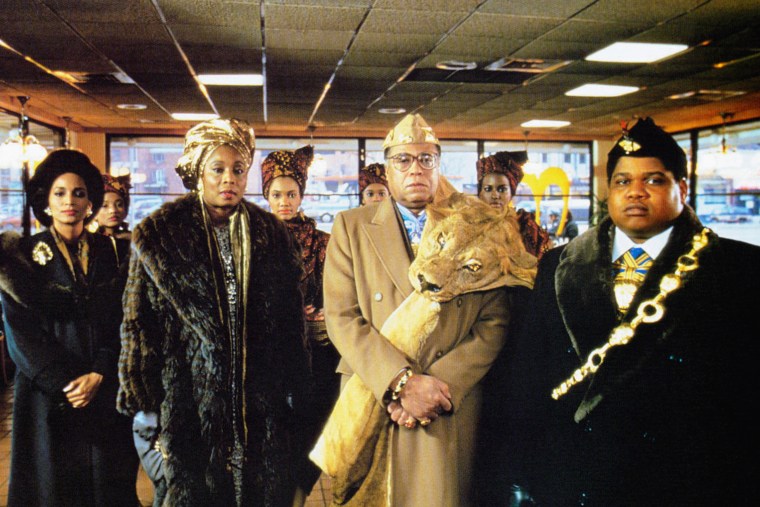
It was treading the boards of Broadway and beyond where Jones forged his place at the top of the marquee. Of his turn as the title character in the 1964 production of “Othello” in Central Park, The New York Times gushed : “Mr. Jones commands a full, resonant voice and a supple body, and his jealous rages and frothing frenzy have not only size but also emotional credibility.”
It was, of course, that resonant voice that would eventually become his trademark.
While he earned two Tony Awards, two Emmy Awards, an honorary Academy Award and a Grammy over his long career, he may be best remembered for an uncredited role in “Star Wars” — supplying the voice for Darth Vader, which has reverberated far beyond that galaxy far, far away.
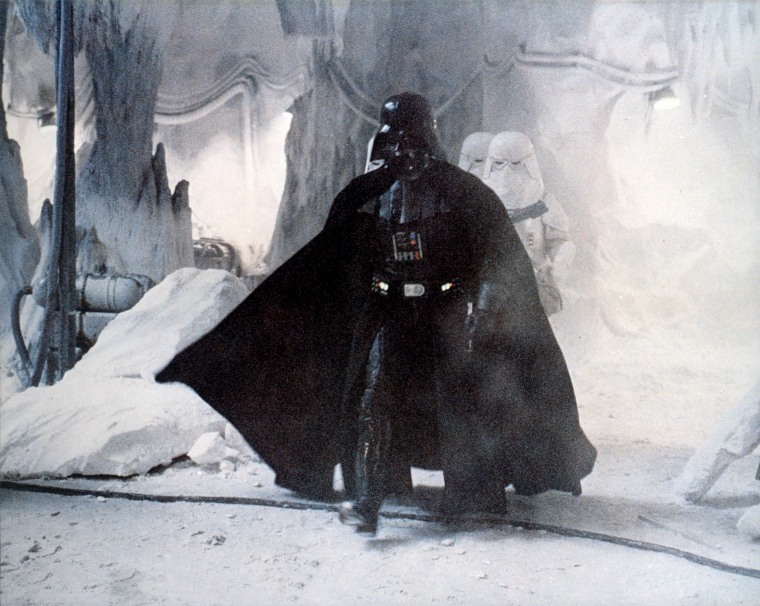
“I’m a journeyman,” Jones told “TODAY’s” Al Roker in a 2017 interview. “I wandered into some interesting situations.”
Making his journey all the more remarkable is that one of the most recognizable voices in Hollywood history had to overcome a severe stutter during his childhood in Mississippi and Michigan before he could take the first step.
Jones, born Jan. 17, 1931, in Arkabutla, Mississippi, said he grew up as a shy and quiet child, wary of speaking and drawing attention to his speech impediment. With his father, Robert, a boxer turned actor, having left home to establish a theater career in Chicago, Jones was shipped to his maternal grandparents’ farm in rural Michigan at age 5.
There, the trajectory of his life changed in high school, when an English teacher taught him how to sound out each word carefully. “I [could] now say things that great writers wrote. I would never have thought of it myself,” Jones told “TODAY” years later.
Jones discovered a love of acting at the University of Michigan, from which he graduated in 1955 after a two-year tour of duty in the Army.
That’s when he moved to New York City, as his father had years earlier, to break into acting. He worked as a janitor part time to pay the bills while he studied at the American Theatre Wing, according to Biography.
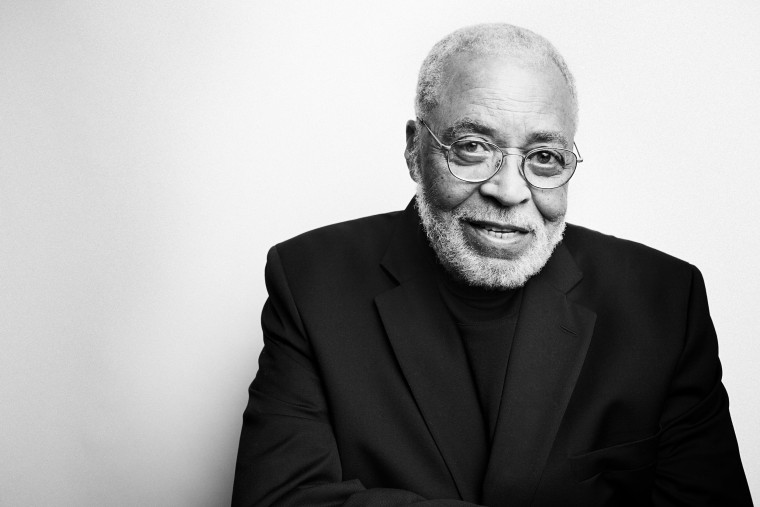
With his booming baritone and stage presence, Jones didn’t have to wait long to get noticed, making his Broadway debut in the late 1950s in the play “Sunrise at Campobello.”
In 1961, he gained acclaim for the U.S. premiere of Jean Genet’s “The Blacks” at the St. Mark’s Playhouse , which co-starred a cast of then-unknowns, including Cicely Tyson, Maya Angelou and Louis Gossett Jr.
Having reconnected with his father, the younger Jones appeared in several stage productions with him in New York, including “Infidel Caesar” and “Moon on a Rainbow Shawl” in 1962 and “Of Mice and Men” five years later.
The younger Jones became a regular in the Shakespeare in the Park program in 1962, with his lauded performance in “Othello” two years later catapulting him to stardom in the New York theater scene.
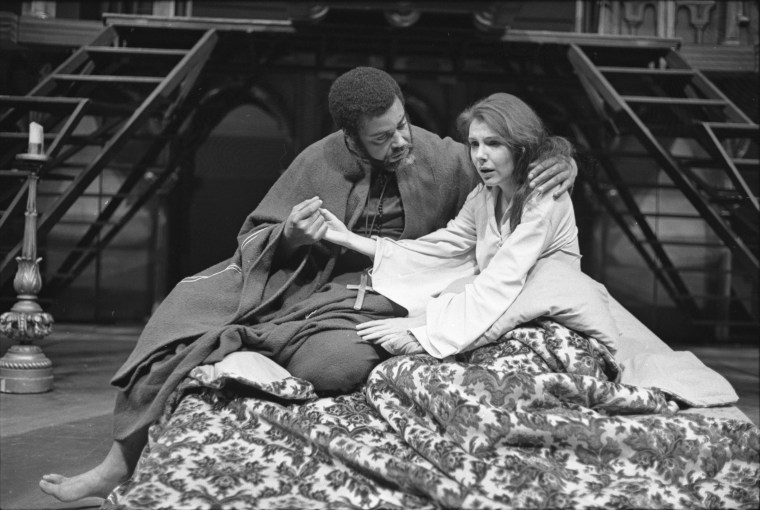
The production earned him more than critical accolades: Jones would ultimately marry his Desdemona, co-star Julienne Marie. The marriage, which lasted from 1968 through 1972, caused a mild stir at the time given the era’s racist taboos surrounding interracial marriage.
Being in New York, then also the center of the TV universe, had advantages for a working actor. Jones scored his first Emmy nomination in 1964 for a guest-starring turn in the drama “East Side/West Side.”
But national audiences would get their first exposure to him the same year in a small role in “Dr. Strangelove or: How I Learned to Stop Worrying and Love the Bomb.”
Jones hit the pinnacle of any Broadway veteran’s career with the play “The Great White Hope,” in which he starred as a fictionalized version of the real-life boxer Jack Johnson. His performance earned him the Tony for best actor in a play in 1969, breaking the color barrier of the most important acting awards in theater.
“When he was ‘The Great White Hope,’ it was shortly after [Martin Luther] King’s assassination, and there were riots in the streets of the United States,” said Dominic Taylor, a professor of African American theater at UCLA. “And here is this Black man who wins for this role in which he’s Jack Johnson, basically. I don’t think people today are aware of how earthshaking that was.”
Jones would go on to star in the 1970 cinematic adaptation of the play, a turn that would earn him a Golden Globe and his only Academy Award nomination. Jones would lose the best actor Oscar to George C. Scott (“Patton”).
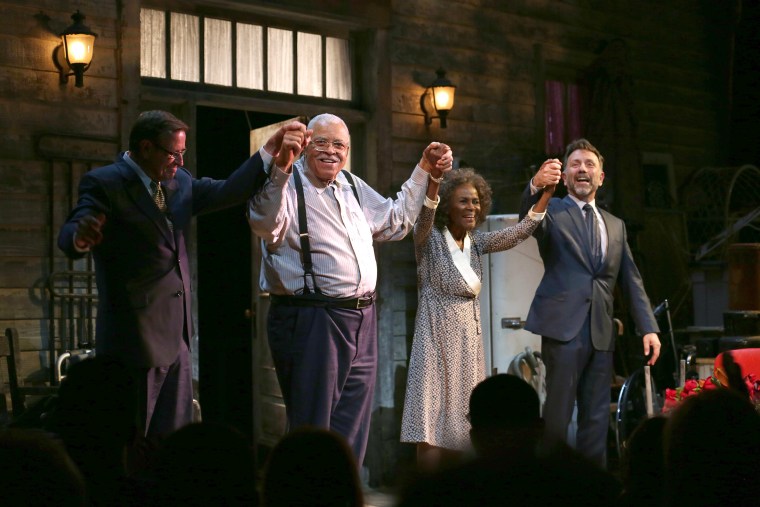
That early success, however, didn’t seem to translate into many more high-profile film roles in the 1970s, although he did star opposite Diahann Carroll in the 1974 dramedy “Claudine.”
“Hollywood back then only had room for a certain number of Black actors,” said Wilson Morales, the founder and editor of blackfilmandtv.com. “He never really got the big roles compared to Sidney Poitier.
“Almost all the roles that he had over the years, they were largely supporting roles,” Morales said of Jones.
Jones would win a Grammy for best spoken word recording in 1977, an early sign of the recognition for his voice.
His most visible on-screen role may have been playing author Alex Haley in the landmark 1977 television miniseries “Roots,” based on Haley’s family history.
Despite the estimated 130 million viewers who tuned in for “Roots,” it would turn out to be just the second-highest-profile gig he booked that year.
Director George Lucas tapped Jones to do some voiceover work for a quirky space opera called “Star Wars” to dub over Darth Vader actor David Prowse’s heavy British accent, made worse by the muffle effect of the mask.
Jones later said he asked to keep his name out of the credits because Prowse did all the work, but such humility wouldn’t keep him from being enshrined as part of the biggest pop culture phenomenon in modern history.
Jones married the actor Cecilia Hart in 1982, the same year he starred opposite budding action star Arnold Schwarzenegger as an evil sorcerer in “Conan the Barbarian.” The marriage would produce a son, Flynn, the same year, and it would last until Hart’s death of ovarian cancer in 2016.
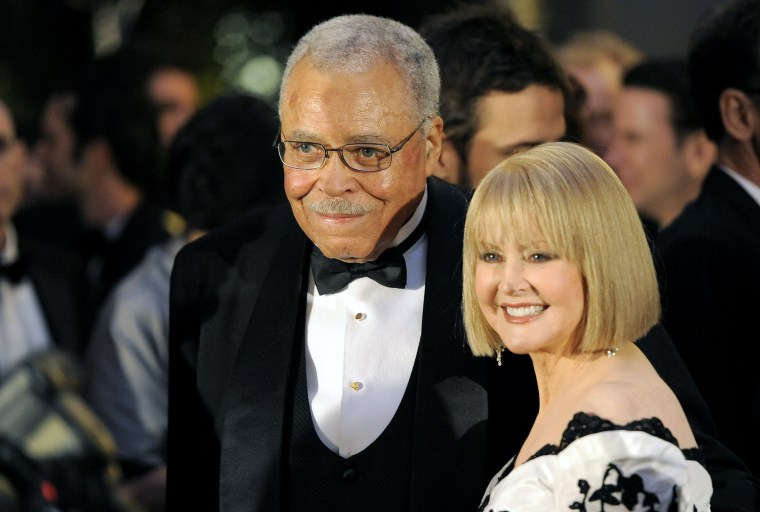
Now a father, Jones continued to work steadily through the 1980s.
Chong remembered the first day she met Jones on the set of “Soul Man,” then intimidated as a girl who grew up with “Star Wars.”
“All the cast was a little afraid of him, not just because he was this towering great of an actor who was Othello in New York and his history,” Chong said. “But in fact, he [turned out to be[ a gentle giant, extremely generous. He’s very kind and soft-spoken.”
Settling into his 50s and past the expiration date for the leading man parts of the era, Jones piled together an impressive run of supporting parts, including roles in “Field of Dreams” (1987), “Matewan” (1987) and “The Hunt for Red October” (1990), a role he would reprise for two sequels.
Perhaps his most famous role of the decade — not counting “The Empire Strikes Back” and “Return of the Jedi” (1983), of course — was as Eddie Murphy’s father in the 1988 comedy “Coming to America.”
“You have to remember ‘Coming to America’ was the biggest Black film of its time,” Morales said. “It was the ‘Black Panther’ of the era.”
He also kept one foot on the boards, earning his second Tony award in 1987 for August Wilson’s “Fences” — a role that Denzel Washington would play in a movie version 29 years later.
In 1990, Jones was cast as the lead in the TV drama “Gabriel’s Fire,” the type of signature role that might have been better appreciated had the series run on a premium cable network two decades later. At the time, however, TV execs considered the material too dark and canceled the show after one season.
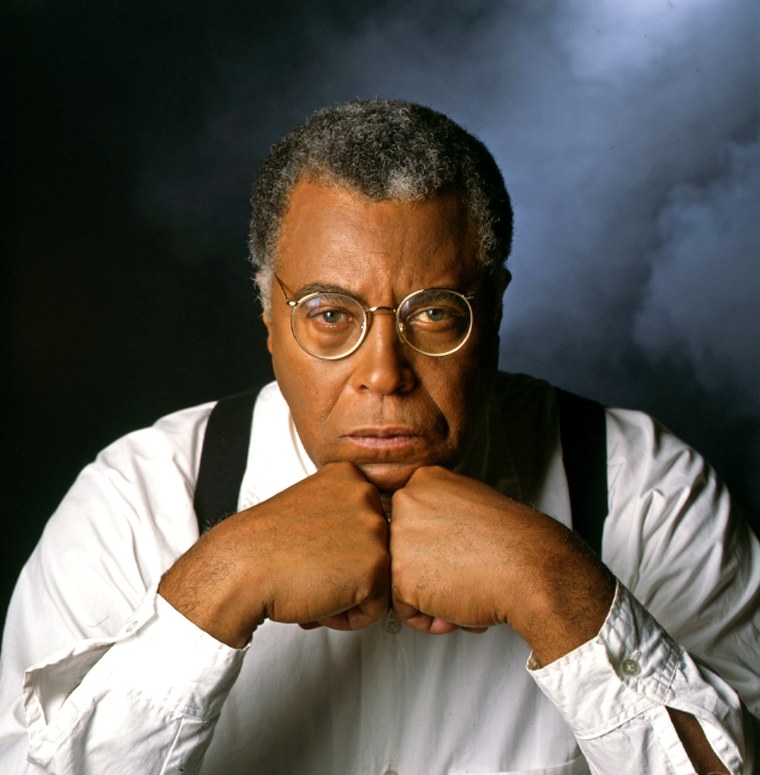
Show co-creator Jacqueline Zambrano remembered being called to meet with Jones about a script during a break in shooting. In most cases, that meant the star would have diva-like demands for rewrites. “I sat down and immediately opened my notebook and I had my pen poised,” Zambrano said. “He started talking about a particular scene and asking me questions. Then we went on to another scene, and, you know, we talked as long as we could until they were ready for him on set.
“We both left, and I looked down at my notebook, and I had nothing written down. He didn’t have any notes. He didn’t want to tell me, ‘I want to fix this.’ He just wanted to understand the text. He just wanted to understand the character better.”
Jones shined enough in that limited time to earn his first prime-time Emmy for outstanding lead actor. (He won a second Emmy that night for his supporting turn in the TV movie “Heat Wave,” about the 1965 Watts race riots.)
In 1994, Jones lent his voice as Mufasa in Disney’s animated blockbuster “The Lion King.” He would return to the role in the live-action version 25 years later, the only actor from the original voice cast to return.
Over the ensuing three decades, Jones continued to work continuously — even after he was diagnosed with Type 2 diabetes in 1995. He racked up Emmy nominations with guest-starring appearances on “Picket Fences,” “Under One Roof,” “Frasier” and “Everwood.” On Broadway, he notched two more Tony nominations — for a 2005 production of “On Golden Pond” and for a revival of Gore Vidal’s “The Best Man” seven years later.
In 2011, Jones was awarded an honorary Academy Award for his career as a whole. That he never won an Oscar for a specific movie role, denying him the coveted EGOT, is a lingering symbol of just how much he was underappreciated over a prolific and profound career.
Taylor, the UCLA professor, always includes a clip of Jones in the 1987 production of “Fences” in his master class on acting.
“He was a gargantuan presence but such a fine, precise, attuned actor onstage,” Taylor said. “It was beautiful to watch him work.”
CORRECTION (Sept. 10, 2024, 10:25 a.m. ET): A previous version of this article misstated the name of “The Lion King” character. It was Mufasa, not Mustafa.
Ethan Sacks writes for NBCNews.com.

IMAGES
VIDEO
COMMENTS
Overall, the movie is historically accurate. It shows the modern viewer the importance of the King's treatment for his speech impediment. This movie also captures the real sense of anxiety in Britain in the 1930s, and it broadly captures the historical context of the Coronation of George VI.
Some of the more egregious historical inaccuracies from his lists are: The time period of the movie. The speech therapist, Lionel Logue, started working with King George VI in 1926, not in 1930's. The severity of his stutter. King George's stutter was relatively mild compared to the movie's portrayal. The politics.
Historians and critics charge that George VI was a nitwit and a Nazi appeaser. On the heels of its 12 Academy Award nominations, "The King's Speech," an inspiring story of King George VI and ...
By Noemi Arellano-Summer Dec. 9, 2021 12:12 am EST. "The King's Speech" is a 2010 dramatic biographical film, recounting the friendship between King George VI of England and his Australian speech therapist, Lionel Logue. The film also covers Edward VIII's 1936 abdication, and George VI's subsequent coronation and shouldering of responsibility ...
As a specialist in British history, I agree that screenwriter David Seidler certainly has tweaked the record a bit and telescoped events in "The King's Speech" — but for the same artistic ...
February 20, 2011 / 11:46 PM EST / CBS News. With 12 Oscar nominations, "The King's Speech" is among the most nominated films of all time. It's based on the true story of George VI, the father of ...
The King's Speech is a 2010 historical drama film directed by Tom Hooper and written by David Seidler. Colin Firth plays the future King George VI who, to cope with a stammer, sees Lionel Logue, an Australian speech and language therapist played by Geoffrey Rush.The men become friends as they work together, and after his brother abdicates the throne, the new king relies on Logue to help him ...
A movie review by James Berardinelli. The King's Speech delivers solid drama with a rousing climax - a fully satisfying and uplifting period piece that achieves its dramatic potential without sacrificing historical accuracy. Unless you count Hitler, who is seen from afar, the narrative is villain-free, allowing the focus to be on the internal ...
Tom Hooper's film, The King's Speech, tells the true story of King George VI's stammer and his relationship with an unconventional speech therapist who helped him speak. The movie was recently ...
Review: The King's Speech. By Scott Foundas in the November-December 2010 Issue. "In the past, all a king had to do was look good in uniform," observes King George V (Michael Gambon)—the first British monarch to address his subjects via radio—early on in Tom Hooper's splendid period drama The King's Speech. "Now we must invade ...
Drama. 118 minutes ‧ R ‧ 2010. Roger Ebert. December 15, 2010. 4 min read. Colin Firth and Helena Bonham Carter. "The King's Speech" tells the story of a man compelled to speak to the world with a stammer. It must be painful enough for one who stammers to speak to another person. To face a radio microphone and know the British Empire ...
The King's Speech is headed for Oscar glory but some have criticized its faulty history. Author Peter Conradi says the relationship between King George VI and his speech therapist was unusually ...
Instead, "The King's Speech" -- a crowning achievement powered by a dream cast -- digs vibrant human drama out of the dry dust of history. Share this on: Mixx Facebook Twitter Digg delicious ...
King George VI. He took over the British throne following his older brother's abdication in 1936. Because of a crippling stutter, he was terribly shy. With the help of an unorthodox Australian ...
0 The King's Speech: Good Movie, Bad History. With Colin Firth playing a royal with a stutter, The King's Speech is certain for Oscar magic, but Andrew Roberts says it gets the story all wrong ...
Royal Mess. 'The King's Speech' is an ugly distortion of history. In a critically and commercially disappointing year for the film industry, one of the few highlights has been the reception ...
October 14, 2010 10:08pm. It perhaps started with The Queen, continued with Young Victoria and now achieves the most intimate glimpse inside the royal camp to date with The King's Speech. Each ...
In Colin Firth. …acclaim with the historical drama The King's Speech (2010), starring as Prince Albert (eventually King George VI) of Great Britain, who enlists the aid of an eccentric speech therapist (played by Geoffrey Rush) to overcome a debilitating stutter. Firth garnered numerous accolades for his poignant performance, including an ...
The King's Speech: Directed by Tom Hooper. With Colin Firth, Helena Bonham Carter, Derek Jacobi, Robert Portal. The story of King George VI, his unexpected ascension to the throne of the British Empire in 1936, and the speech therapist who helped the unsure monarch overcome his stammer. ... The entire movie is a perfect blend of history ...
Based on the life of King George VI, The King's Speech follows George before and during his initial reign of Britain after his brother's abdication of the throne in 1936. Possessed of a pronounced stammer that impedes his speech, George hires speech therapist Lionel Logue to help him overcome his issues.
"The King's Speech" was made for under $15 million. But now the movie, the director, the screenwriter David Seidler, who made it happen, and all the principal actors were nominated for Academy Awards.
Rated 4/5 Stars • Rated 4 out of 5 stars 08/29/24 Full Review Alan g Great movie based on real history. Fabulous acting all around. ... I Can't Speak The King's Speech: Official Clip - I Can't ...
Biopic about Britain's King George VI (father of present day Queen Elizabeth II) and his lifelong struggle to overcome his speech impediment. Suffering from a stammer from the age of four or five, the young Prince Albert dreaded any public speaking engagement. History records that his speech at the closing of the 1925 Commonwealth exhibition in London was difficult for both him and everyone ...
The actor, who earned Tony Awards, two Emmy Awards, an honorary Academy Award and a Grammy and whose inimitable voice gave life to Mufasa and Darth Vader, died Monday, his agent said.